
For the Year Ended 31 July 2023
Charity Number:



For the Year Ended 31 July 2023
Charity Number:

President and visitor

The Right Rev’d Dr John Inge
The Lord Bishop of Worcester
The primary object of the College, as stated in the Royal Charter, is: “to carry on at Malvern or elsewhere a School for Boys and Girls or for children of either sex in which they may receive a sound religious, classical, mathematical, scientific and general education in conformity with the principles and doctrines of the Church of England.”
Status and administration
Malvern College is incorporated under Royal Charter originally granted in 1929, together with a Supplemental Charter granted in 1992. It is registered with the Charity Commission in England and Wales under charity registration number 527578.
Nominated Councillors: the following may each nominate one Councillor for a five-year term:
» The Lord Lieutenant for each of the Counties of Gloucestershire, Herefordshire and Worcestershire;
» The Vice-Chancellors of each of the Universities of Oxford, Cambridge and Birmingham;
» Each of the Boards of the Admiralty, the Army and the Royal Air Force; and
» The Headmaster or Headmistress and Assistant Masters and Mistresses.
Elected Councillors: The Governors of the Corporation elect ten Councillors. The two longest-serving retire on rotation each year and can be re-elected.
Co-opted Councillors: The Council may appoint between six and ten Councillors for a five-year term.
The above is a summary. Full details of the Constitution are specified in the Bye-Laws in The Royal Charter.
Officers & key management personnel:
Headmaster – A K Metcalfe Esq
Chief Operating Officer & Clerk to the Council – R A M Breare Esq
Senior Deputy Head –Mrs S G Angus
Deputy COO & Group Director of Finance – Mrs N R Roberts
Headmaster, The Downs Malvern –A Nuttall Esq
Registered address and principal office:
Malvern College College Road
Malvern
Worcestershire
WR14 3DF
Independent Auditor:
Crowe U.K. LLP
4th Floor, St James House
St James Square
Cheltenham
Gloucestershire
GL50 3PR
Bankers:
Lloyds Banking Group PLC
48 Belle Vue Terrace
Malvern
Worcestershire
WR14 4QG
Lawyers:
Veale Wasbrough Vizards
Narrow Quay House
Narrow Quay
Bristol
BS1 4QA
1.
6.
7.
8.
10.
11.
12.
13.
We instil and nurture within our pupils emotional and cultural intelligence; to develop core skills, qualities and intellectual curiosity; and to facilitate the attainment of the qualifications our pupils need.
So that they become happy, balanced and successful individuals who achieve personal fulfilment, determined and able to make a positive contribution to the world they go out into.
We are one family, in four countries:
» Malvern College is at the heart of our family, based in Great Malvern, UK.
» Our UK prep school, The Downs Malvern is based close by.
» The family includes franchise international schools in China (Chengdu and Qingdao), Japan (Tokyo opened September 2023), Hong Kong, Egypt, and Switzerland (closed September 2023)
A global community of more than 4,400 pupils, 1,750 staff, and more than 10,000 alumni.
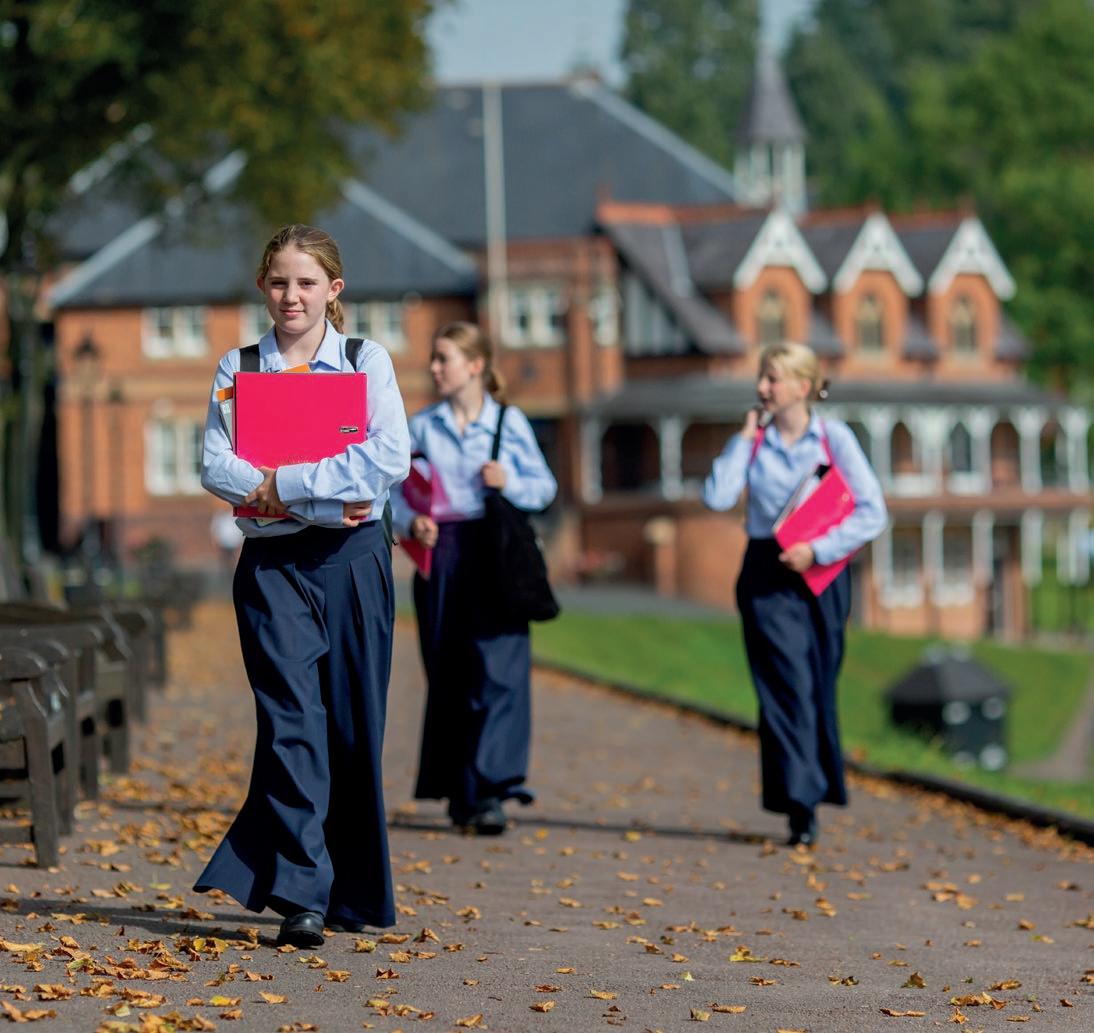
The Malvern College Family of Schools is made up of 8 different legal entities:
1. Malvern College
2. Malvern College Enterprises Ltd
3. Malvern College International Ltd
Malvern College Group accounts (consolidated)
4. College Guardians Ltd
5. Abberley Hall Ltd (CLOSED 30 June 2023)
6. The Downs, Malvern College Prep School Ltd (merged with the College from 1st November 2022)
Educating 990 pupils Employing 570 staff
Malvern College’s UK family (not consolidated)
Malvern College’s International family (not consolidated)
The above 5 entities plus:
1. The Malvernian Society Ltd
2. Abberley Hall Enterprises Ltd
Franchise international schools operating in:
1. China (2), Japan (1) & Hong Kong (1)
2. Egypt (1)
3. Switzerland (1)
Educating 3,433 pupils Employing 1,178 staff
More than 4,400 pupils Taught by over 1,740 staff On 8 campuses
2022-23 Year in Numbers
Pupils: 4,424
» Malvern College: 641
» Prep Schools: 350
» International schools: 3,433
Alumni, past staff and past parents: 11,973
* On the database
Contribution from trading subsidiaries (Enterprises, College Guardians and International): £2.2m
Total Operating Costs: £34m
Malvern College:
» Boys: 336
» Girls: 305
» Boarders: 66%
» Day: 34%
College Guardians care for: 1,287 pupils
Malvern College’s UK family
Donations received from Malvernian Society: £0.25m
Gross fee income: £31m
Staff: 1,745
» Malvern College & Preps: 567
» International Schools: 1,178
* Headcount and approximate due to change in year
Meals catered: 1,001,599
Malvern College:
IB Results: 35 average A-levels: 60% A*-B
Total concessions: £4.5m
Pupils with means-tested financial assistance: 70
Bednight lets in the holidays: 7,780
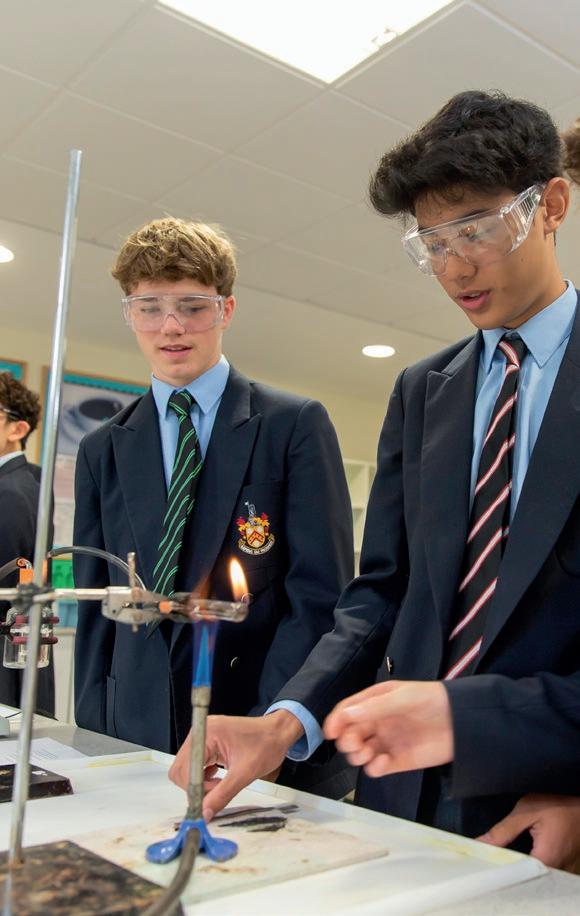
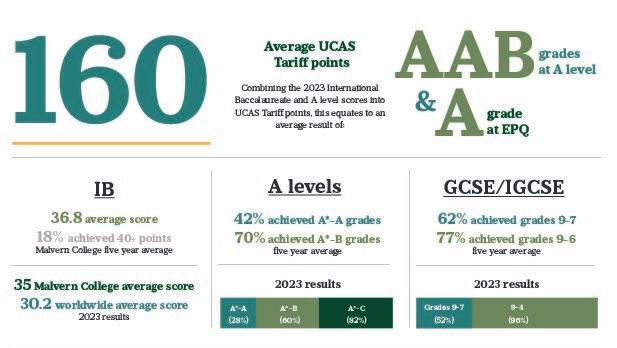



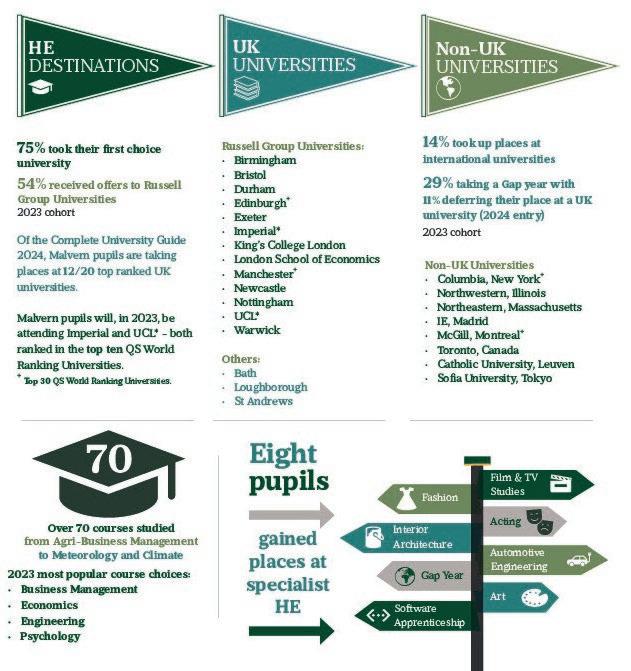
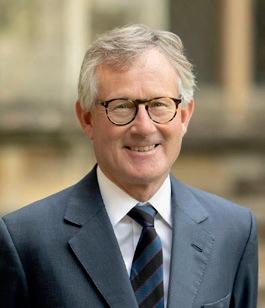
The energy, enthusiasm and diligence of The College community throughout the 2022-23 year has been exceptional; and I would like to extend my thanks and congratulations to the staff, parents, alumni and, particularly, the pupils that make this possible.
There has been much to celebrate with another year of strong A-Level, IB and GCSE results. Pupil recruitment continues to be among the highest in the College’s 159year history; The Downs Malvern Prep School officially become part of the Corporation of Malvern College; and our international schools are going from strength to strength, with Malvern College Tokyo opening in September 2023 albeit Malvern College Switzerland closed in July 2023.
2022-23 has been a year of consolidation post-pandemic, with a focus on excellence and efficiency across our educational and operational teams. This has been vital to mitigate the impact of persistent cost inflation across the UK, and to ensure resilience in the event of the possible loss of charitable tax benefits, most notably the threat of VAT being added to school fees, potentially as soon as April 2025. Despite these pressures, The College and
The Downs together delivered a robust EBITDA of £0.9m for the 2022-23 year, supplemented by £2.2m of contribution from our international schools and other commercial activities.
The merger of The Downs and The College has been a positive step forward, allowing the two schools to act fully as ‘one school, two sites’. Under the leadership of Andy Nuttall, as Headmaster since March 2022, The Downs has gone from strength to strength with year-on-year growth in pupil numbers and a myriad of improvements to the educational offer, culminating in the complete refurbishment of the Music School in Autumn 2023.
Sadly, in July 2023 at the end of the Summer Term, Abberley Hall prep school closed its doors for the last time despite the extensive educational and financial support of The College over the last 4 years.
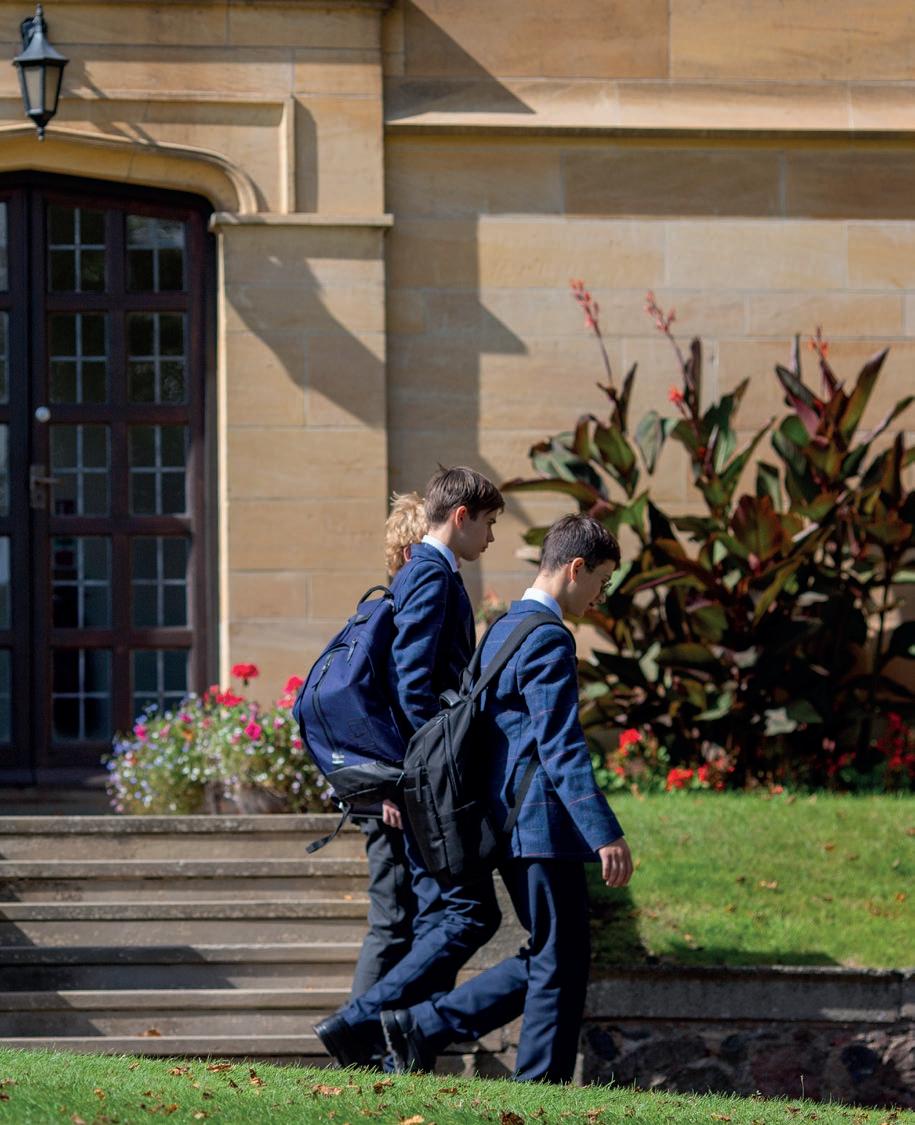

Following the announcement of closure in January 2023, the Abberley Hall team demonstrated an extraordinary level of professionalism through to the very last moment, providing the pupils with the support needed to transition smoothly to their next schools.
Overseas, our international school profile grew steadily from 3,000 to over 3,400 pupils over the last year, delivering exceptional academic results with pupils going on to leading universities around the world, and particularly here in the UK. The Malvern College Family of Schools will continue to expand with the recent opening of Malvern College Tokyo with a number of interesting opportunities currently under review. Our international operations bring a Malvern College education to pupils around the world and are increasingly important in enabling us to both invest in the UK estate and build our bursary endowment fund over the long-term; and demonstrate the soft power of British independent education around the world.
The generosity of parent and alumni donors has historically been a vital pillar of support for the College. 2022-23 saw our first ever ‘Green Giving Day’ raising more than £100,000 for sustainability projects from more than 300 donors and earning an award for best fundraising initiative from the Institute of Development Professionals in Education. The College community is truly grateful for all the support received over the years and welcomes interest in supporting our future projects.
Looking ahead, the independent education sector faces significant economic and political uncertainty, particularly here in the UK. It will be a time of change but, as ever, also a time of opportunity and it is with this in mind that the Council, management and the wider teams have been engaged in extensive long-term planning over the course of the last year. We are in the final stages of our new ‘Development Plan’, preparing our vision, strategies and estate masterplans for the next decade. The final plans were reviewed and approved by Council in December 2023 before being shared with the wider community and at our Annual General Meeting in March 2024. A new 6th Form Centre in the Memorial Library and a new College café and co-working space in the much-loved Grub will be the first of the estate projects, both opening in 2024, alongside a long-term investment into enhancing existing boarding and teaching facilities over the coming years.
Over the coming year, Council’s focus is to ensure that the College has a clear vision for the future, a roadmap to get there and the resources to see the journey through. After a period of streamlining our governance and structures, we are well positioned for future growth.

Robin Black Chair, Malvern College Council

For a Head, September is the best month of the year. With the start of the new academic year come the sights, smells and sounds of a great institution gearing itself up again:
freshly painted and vigorously cleaned boarding houses; Chapel pews rammed with pupils and staff, excited about seeing each other again, and with the enthusiastic excitement, and a little trepidation, for the opportunities to come; parents slightly nervously dropping off their dearly beloved, but themselves excited about living vicariously through an education system that is (probably!) far more engaging and enjoyable than the one they experienced.
In September, a new post of Director of Innovation and Collaboration started work supporting pupils leading societies and activities within the super-curriculum at Malvern College in the UK, whilst also chairing a committee of representatives from the Malvern College International Schools looking to develop initiatives and opportunities for pupils to optimise the value of being part of a global education group. Alongside this,
the Malvern Award was launched as a way to reward and encourage pupils who engage in the full holistic education that Malvern offers, with Gold, Silver and Bronze awards to recognise the different levels that pupils achieve over their time at the College.
The academic year 2022-23 also marked 30 years since Malvern became a co-educational school, when in 1992, Ellerslie, a neighbouring girls school, formally joined the College. To mark this momentous occasion there have been a number of special events including OMs Lara Vafiadis and Rose Harvey talking to current pupils about their recent feats in rowing single-handedly across the Atlantic and being the first British woman home in the 2022 London Marathon respectively; and a very well attended Ellerslie Old Girls dinner in May 2023 with over 160 guests from all across the world.
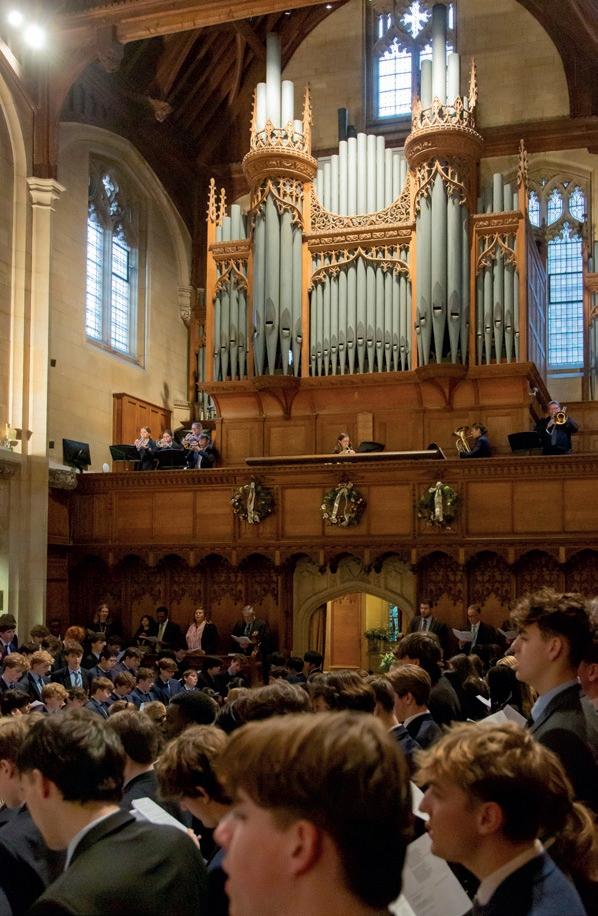
Amongst other things, a focus on parental engagement was a key objective for the year, and so with a new performing arts events guide that underlined both the number of opportunities, and the different ways that parents could attend (in person, live-streamed, or accessing a set of recordings) parents enjoyed a wide range of performances and concerts, with highlights probably being the House Singing Competition, the Christmas Concert and College Carols, the school Musical, Les Misérables, and summer’s concerto evening for our elite musicians.
The highlights of the Spring Term sports programme included a fantastic Rugby 7s season with a number of trophies for the boys’ 1st VII, matched by some excellent netball from the girls with an exciting win in a live-streamed charity match against a very talented local rival school. Sporting excellence continued into the Summer Term with the boys’ 1st XI cricket team reaching the national T20 finals at Arundel Castle for the fourth year in a row.
Over the full year, with The Downs Malvern formally becoming part of the Malvern College Corporation, there has been an ever-increasing collaboration with the focus being ‘one school on two sites’. From operations to sports, and academic departments to pastoral care, there has been a particular focus on ensuring coherence, efficiency and for those pupils who
make the transition from Year 8 at The Downs to FY at the College (the vast majority), a smooth and stress free transition, allowing them to enjoy and take the maximum benefit from their final year at Prep School when they are at their most curious and excited about exploring their own intellectual horizons.
Given the positive trajectory that The Downs is on, and particularly in its relationship to the College, it was very disappointing that we had to announce the closure of Abberley Hall prep school, which had joined the Malvern family in 2019. Winning the national Tatler Award for Best Prep School was a wonderful accolade in the autumn of 2022, but even with this accolade and the fantastic work the team were doing to make it such a good school, market forces and stubbornly low pupil numbers, as well as the high costs of running a very large and heritage site, simply made the business model unsustainable.
The academic year ended on a high with a fantastic final week of celebration with Speech Day, Prize Giving and a wonderful Leaver’s Ball, but immediately were cleared away to allow the College to continue to serve as a base for a holistic education to a wider audience as a stream of summer activity weeks, sports festivals and international schools visited and made optimal use of the excellent facilities, just as the NSSO (National Schools Symphony Orchestra) had filled the buildings with music during the Easter holidays.
As ever, during the summer holidays we received the year’s public exam groups. Given the widely reported return to 2019 grades, it was no surprise that results did indeed return to pre-pandemic levels. As a key marker of continued academic success, 75% of our leaving cohort went on to their first choice universities, which included a full range of nationally and internationally ranked universities within the UK, Europe and North America.
So, a year with many successes to celebrate, but more importantly, one with many individual stories of personal growth and development as pupils and staff have learned new skills and important life values, so that as they leave they take the confidence and the competencies gained at the Downs and the College to make a positive difference to the world they go out into.

Keith Metcalfe Headmaster
1. To carry on at Malvern in the County of Worcester or elsewhere a School for Boys and Girls or for children of either sex in which they may receive a sound religious classical mathematical scientific and general education in conformity with the principles and doctrines of the Church of England.
2. To create and administer and to assist in the creation and administration of scholarships exhibitions and prizes for the encouragement of study and learning and to act as trustees of any endowment legacy bequest or gift for educational purposes.
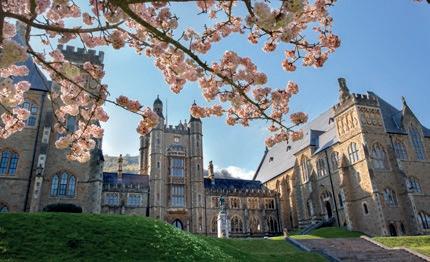
1. To enhance the Malvern College Family of Schools’ national and international reputation.
2. To secure long term financial sustainability.
5-Year Goals * alongside development funds for the College
1 Family of Schools with 6,800 pupils
1. Facilitate the attainment of the qualifications pupils need.
2. Instil and nurture emotional and cultural intelligence.
3. Develop core skills, qualities and intellectual curiosity.
£6m Surplus EBITDA £5m increase in the Society endowment fund*
8 International schools (+1 partner, +3 countries, +3 schools, +2,000 pupils)
1 Consolidated charity for UK schools (+ 60 pupils)
Unashamedly an academic school, but determinedly not a hothouse.
1.1. Strong and varied core-curriculum:
» FY (Year 9): focused on engagement and experience; developing core and transferable skills with highlights including cross-curricular projects, CCAs and FY passport
» GCSE (Years 10-11): breadth of choice and experiences
» IB and A level (Years 12-13): catering to the individual; delivering choice and a variety of subjects and skills
» excellent exam results and first-class preparation for university applications in UK, North America and Europe
1.2. Pupil-led super-curriculum:
» encourages pupils to develop in the areas that interest and inspire them; challenging them to think and create their own intellectual pathway
» provides opportunity for pupil leadership, ownership, innovation and collaboration; developing pupils’ transferable academic skills: research, logistics, marketing etc
» preparing them for university or degree apprenticeships, and future careers
Intentional holistic education; encouraging creative and sporting endeavour; promoting individual and collaborative participation to:
2.1. provide opportunities for skill development and intellectual engagement at all levels (from elite to purely participatory) across art, drama, design technology, music, sport, CCF and outdoor pursuits
2.2. provide opportunities for responsibility, service and leadership (e.g. through D of E, CCF, Service, school partnerships and expeditions)
And through these:
» promote and instil an understanding of physical and mental health, and well-being
» intentionally promote the development of core values (Malvern Qualities) such as resilience, collaboration, ambition and open-mindedness
» develop positive transferable skills that give pupils the confidence to lead and to serve
» develop a sense of self and responsibility towards others, ensuring emotional and cultural intelligence are developed alongside intellectual intelligence.
The underpinnings of happy and healthy young people. A secure and supportive environment where:
3.1. Houses are a familial ‘home from home’, forming ideal settings where communities support each other
3.2. each pupil is known and supported, confident to discover their strengths and plot their individual pathway
3.3. well-being is a core focus with safeguarding at the centre
3.4. opportunities for responsibility, service and leadership, and the development of the Malvern Qualities, equip pupils to seek opportunities and overcome life’s challenges
3.5. pupils are encouraged to reflect on the value of diversity, inclusivity and equality
3.6. parental and alumni engagement promotes life-long relationships with and support for the College
Staff planning reflects the value of diversity, inclusivity and equality
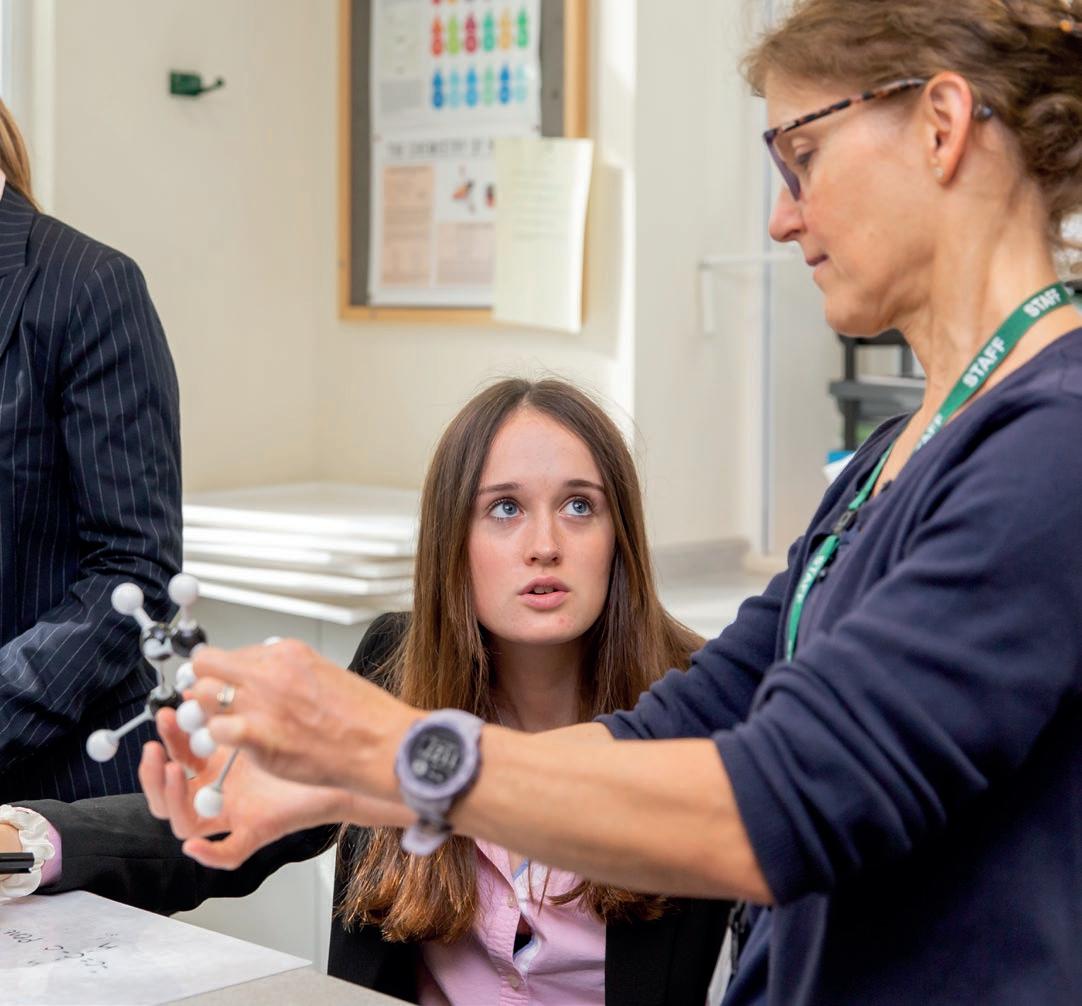

To achieve financial sustainability across the group at an overall surplus level, generating substantial non-fee income from fundraising, franchising and other commercial activities that can be invested in transformational bursaries and campus developments.
Goals: (i) £7m MCFS EBITDA, (ii) College
Concessions at 14.5% of gross fees, (iii) £3.5m surplus from commercial activities, (iv) £1m net contribution from development
a. fee inflation to remain at or below CPI, and absolute fees to be line with the median for direct peers
b. greater means-tested concessions, focused on securing families in the local and domestic market
c. leverage economies of scale across the family of schools to generate purchasing efficiencies
d. investment in forward-looking 10+ year campus masterplans that (i) deliver a transformational education experience (ii) approach carbon neutral and (iii) maximise commercial income
e. renewed focus on fund-raising and investment management as an important income stream
f. expansion of overseas franchise opportunities and diversification of partners and locations/continents
g. investment of 25% of MCIL net-income into an endowment fund for transformational bursaries when cash-flow allows
h. develop further the College’s commercial activities with a focus on expansion of Summer Programmes
i. ensure Net Debt is kept within the range of £10-15m.
To create a fit-for-growth operations capability that adds value across the family of schools by providing services that are tailored to individual needs and identities
a. structure and resource our operations teams to meet the needs of both the College and the wider family of schools, driving efficiencies through the sharing and application of best practice
b. support and develop staff through good management and appraisals, clarity of communication and ongoing professional development
c. invest in payroll, HR and admissions systems that can work across schools and which enable efficiencies and improved decision making
d. ensure our digital infrastructure (virtual and real) keeps pace with fast-changing technologies and needs, whilst maintaining the highest levels of cyber security and protection
e. Staff planning reflects the value of diversity, inclusivity and equality.
To attract, retain and satisfy the needs of customers who can afford to pay for a ‘Malvern’ education. To exploit the advantages of a growing family of schools and to develop further our links with parents and alumni
a. continue to modernise, improve and develop the Marketing, Communications and Admissions strategy and tactical activities, both at the College and at the associated family of schools
b. enhance customer awareness and understanding of the concept of a Malvern Education and the unique journey pupils follow at Malvern and its associated schools
c. development of a global brand which supports the strategic objective for growth and positions Malvern College as a leading global provider of education which attracts pupils who will benefit from a Malvern education and top quality academic and operational staff.
Monitor, develop and improve governance, leadership and performance management across the College and Malvern Family to ensure coherence and consistency of excellence across all entities within the corporation
a. develop a sustainable long-term strategic plan alongside a review of our corporate governance in general and the Royal Charter in particular
b. provide the resources required to enable the Schools to meet their educational, financial, legal and charitable objectives
c. ensure that the various Committees, Boards and Trustee memberships of all entities within the ‘Trust’ are structured and led optimally to develop effective Governance and oversight
d. Appropriate measures and oversight are in place to ensure diversity, inclusivity and equality.
To seek out and develop further growth internationally, both with existing partners and, where appropriate, with new educational partners, ensuring a greater spread of schools globally, and where possible, in first tier cities.
The short-term plans that were enacted in the year to achieve these objectives were:
» To develop balanced and meaningful enrichment & stretch opportunities for all year groups and increase participation.
» To build upon the departmental appraisal process by following up findings and setting specific targets for both the department and the individuals within it.
» To further develop a range of pupil-led societies that engage all pupils through a broader range of choices and effective communication.
» To operate throughout the year with tight control on costs and a thorough and successful pupil recruitment strategy.
» To review bursary levels and other public benefit contributions by the College continually.
» To develop the marketing and admission function and enhance marketing communications.
» To provide the resources required to enable the College to meet its educational, financial, legal and charitable objectives.

The strategies, objectives and plans are reviewed and updated by the College Senior Leadership Team to ensure that the objectives are being achieved. The fundraising activities are undertaken by the College Development Office in conjunction with the Malvernian Society. The College Management Board and Council reviews the progress of fundraising and future strategies and targets.
The College Council and Management Board formally reviews the 10-year plan annually.
The specific objectives for the coming year include:
» Widen profile of IB cohort and increase IB numbers to achieve greater balance between IB and A level numbers. Adapt (I)GCSE curriculum to provide greater flexibility through a 9 GCSE +1 option model.
» Development of clear strategies for ICT in Teaching & Learning, and Academic Literacy.
» Embed Director of Collaboration and Innovation role within MC’s Super-Curriculum leadership, and begin to develop the role and initiatives across MCFS.
» Appointment of Mental Health Lead and develop strategy, including embedding integrated counselling model.
» Develop and support leadership and management skills of line managers.
» Introduction of online systems to improve efficiency in operations.
» To facilitate greater sharing and application of best practice across the family of schools to build personal and team excellence.
» To improve the bursary application process by introducing bursary management software.
» To continue with the boarding house refurbishment plan.
» To continue to explore opportunities to extend our international schools programme.
Future plans are focused on the strategic development of the family, whilst capital expenditure plans focus on improving the College experience, the continuation of the Boarding House refurbishment programme and improved environmental sustainability. The strategic aims and goals for the medium term are to provide excellent education, secure the College’s long-term financial strength and to enhance our national and international reputation.
The greatest risks currently facing the College are:
1. Political pledges/threats of loss of charitable tax benefits, including VAT on fees.
2. Inflation (especially electricity and gas prices) and associated increases in Bank of England base rates together with an unstable economic climate.
3. Further increases in employer contributions to the Teacher Pension Scheme (TPS).
4. Geopolitical tensions and subsequent impact on International Schools and on wider inflation.
5. Future ‘Green’ investments that will be needed to keep up with statutory requirements.
Please see page 38 for details of the mitigations and controls in place to address these risks.
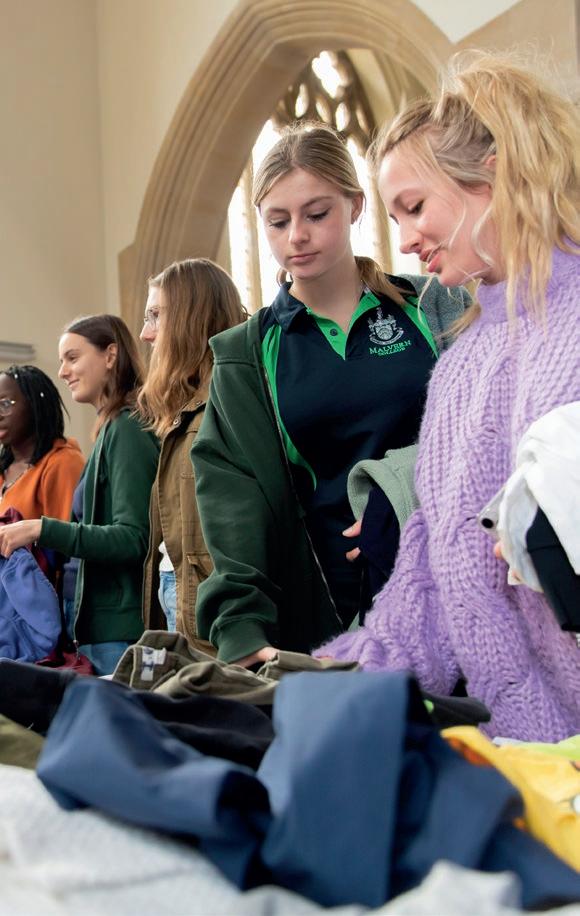
Our goal is to reach Carbon Net Zero at the latest by 2050. Malvern College enjoys an exceptionally beautiful heritage estate, first founded in 1865, but the predominantly Victorian buildings are in need of significant upgrades to bring them closer to modern energy efficiency standards.
Addressing environmental sustainability at the College is driven by multiple imperatives:
1. Playing our part to address climate change
2. Providing an appropriate ‘environmental role model’ to pupils
3. Reducing The College’s energy consumption costs (and exposure to fluctuations)
Biodiversity: Approximately 210 acres of the 235 acre estate is green.1,700 specimen trees and 80 new trees, along with 1,000 hedge whips, have been planted. The area known as ‘9 Acre’ has been largely returned to meadow, with 4 acres of wildflowers. Across the College there are 3 sedum roof coverings.
Facilities: Daylight and motion sensitive LED lighting programme has been implemented. 70% of our 97 boilers are SEDBUK rated ‘C’ or above. Electric car charging points are in place, 51 bikes have been purchased in the Cycle-to-work-Scheme, and these along with our day pupil transport scheme and significant on-site accommodation for staff, notably reduces road transport.
Waste: All waste is streamed into three recycling stations and 100% of cementitious, arboricultural and land waste is reused on campus. Central catering production waste is turned into fertiliser pellets and cooking oil is recycled. We have removed waste by introducing re-usable water bottles across campus and providing recycling bins across all facilities. In 2022-23 we introduced ‘Chef’s Eye’, a technology to better track and so mitigate food waste in our catering offer.
Energy: 100% of electricity used at The College and The Downs is now from renewable sources.
Pupil engagement: A pupil ‘Environmental Action Group’ meets regularly to identify potential for waste reduction and to identify other potential initiatives for both pupils and staff to undertake.
During the 2022-23 year, we engaged CBG Mechanical & Electrical Consultants to review our energy consumption, with the Sports Centre/CUP, main building and 7/Ellerslie clearly identified as the largest demand.
(please see above right illustration)
During the 2022-23 year, we engaged CBG Mechanical & Electrical Consultants to review the most cost-effective means of reducing our carbon footprint.
Our priority projects are:
1. To re-commission the Combined Heat and Power (CHP) unit in the sports centre and introduce a new CHP unit in Main Building to replace an obsolete system, and over the long-term provide electricity to drive a Ground Source Heat Pump project.
2. To ensure that all House refurbishments (one per annum) include sustainability measures: replacement of windows, LED lighting, insulation, two-pipe heating systems and boiler upgrades where appropriate.
3. To move our £6m+ endowment investment portfolio into a ‘Climate Active’ fund, where investments are aligned to the spirit, and content, of the 2016 Paris Agreement under the United Nations Framework Convention on Climate Change.
4. To ensure that our purchasing policy reflects sustainability at its core.
(please see below right illustration)

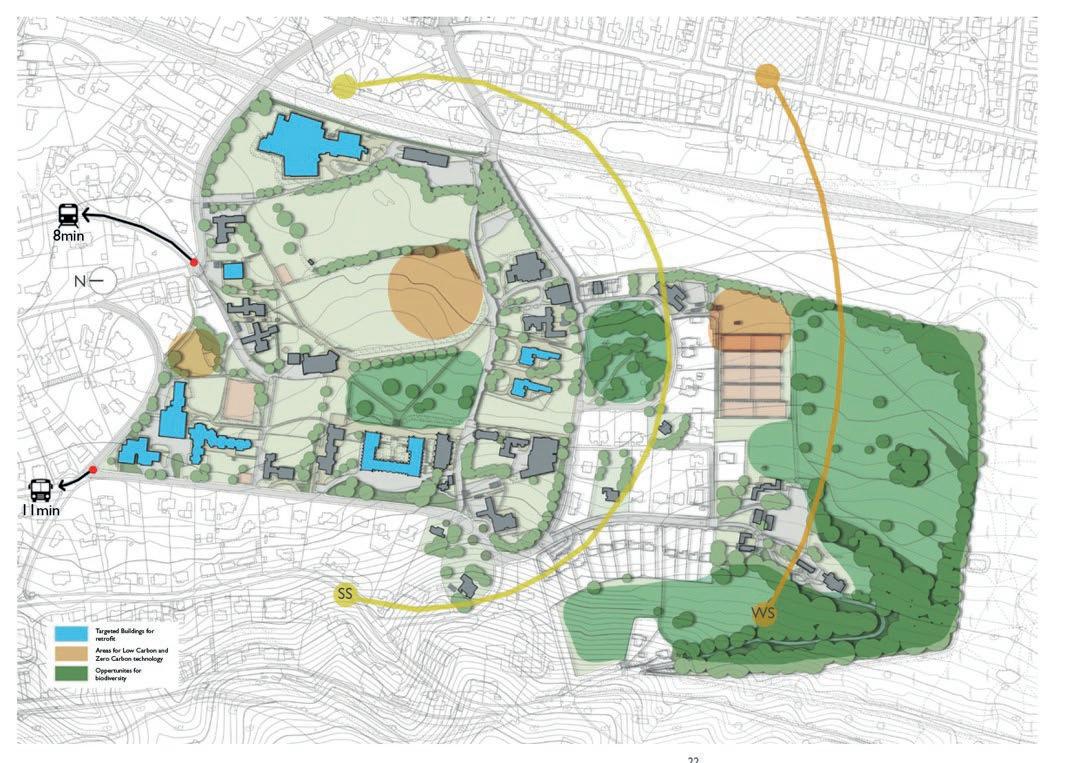
The College Council confirms that they have complied with the duty in Section 17 of the Charities Act 2011 to have due regard to the public benefit guidance published by the Charity Commission. The significant activities undertaken to carry out our aims for the Public Benefit and our achievements measured against those aims include the following projects and programmes.
The College Council is acutely conscious that the College must remain accessible to children irrespective of parental means. It is determined to ensure that the funds it has available are directed to cases of the greatest need.
Bursaries are reviewed periodically based on a returned and completed bursary application form. The Bursary Committee comprising the Headmaster of the College, the Headmaster of the Downs, Chief Operating Officer, Director of Marketing & Admissions, Head of Admissions and the Director of Finance considers all bursary applications on a case-by-case basis. Information about fee assistance through bursaries is provided on the College website and is contained within the College scholarship literature.
The College and the Downs also offers fee concessions for academic, sporting, musical and artistic excellence in the form of Scholarships and Exhibitions; as well as to children whose parents are in the Armed Forces, to families with two or more children at the College, to former pupils of The Downs Malvern and Abberley Hall, to children of College employees and to children of Old Malvernians, Old Ellerslie Girls, Old Hillstonians, Old Downians and Old Abberlians. The College Council reviews the levels of these concessions annually and further details are provided on the College website.
During the year the College and The Downs, awarded £4.0m of scholarships, bursaries and other awards; with approximately 106 pupils representing 12% of the total school roll being in receipt of some means-tested bursarial support. It is the College’s long-term goal to move as much of the Concessions investment as possible into means-tested financial support.
£4,500,000
£4,000,000
£3,500,000
£3,000,000
£2,500,000
£2,000,000
£1,500,000
£1,000,000
£500,000
£0
Malvern College recognises its place in the local community and is always looking to do more to contribute to the area, for example by improving educational provision for all local students and working in partnership with local state schools. The pupils’ School Council and individual Houses have charitable fund-raising high on their lists of priorities for the year and all pupils are expected to do some form of service, whether that is internally within the school, or externally, supporting charities and events in the local area.
Malvern College has a number of partnerships with local maintained schools. These include The Wyche and Malvern Parish Primary Schools, as well as The Chase and Dyson Perrins Secondary Schools. Several staff are Governors at local schools, enabling sharing of good practice and expertise on a collaborative and mutual basis. Local schools and other community activities use the College’s facilities for their events at either a reduced cost or free-of-charge, for example the running track for The Chase and Dyson Perrins’ school sports days, our theatre for local primary school productions (with technical support and assistance provided) and a local performing arts school, the swimming pool for swimming lessons for a number of primary schools, performance spaces for music concerts such as those run by the Malvern Civic Society, NADFAS exhibitions.
One particular thriving initiative has been our Magic of Science event with chemistry demonstrations by Nick Barker, the University of Warwick’s Outreach representative. These days have been run for several years and have strengthened our links with Malvern Parish School, Welland Primary School, Hanley Swan Primary School, the Wells Primary School, the Wyche Primary School, Hollymount Primary School, Our Lady Queen of Peace Primary School and Callow End Primary School. The event is always oversubscribed reflecting the level of interest generated by these scientific outreach days.
For the past 4 years we have been working to support MRATHS. We continue to host a display showing the various technologies developed at Malvern College during WWII and within Malvern since the war and MRATHS have continued to use our lecture theatre and science centre for their meetings. MRATHS scientific experts gave a highly informative demonstration lecture on infra-red at the Physics Olympics event which local state schools were invited to and which our own pupils attended.
Malvern Priory is our parish church, and we have strong links with them through the chaplaincy at the College. The vicar is a regular visitor to college and preaches termly in chapel. We support the young people at the Priory by offering opportunities for confirmation preparation with our own pupils. We are regular performers at and supporters of their lunchbox concert series.
During Lent term 2024 the Priory is closed for major works to be undertaken and the main Sunday congregation are using the College chapel for worship.
During the last academic year pupils raised over £15,000 for charitable causes including supporting MIND, British Red Cross, the OSCAR Foundation, the Salaam Baalak Trust, the Doddie Wier Foundation, James’s Place and the HOKISA Aids Orphanage in South Africa. This year, pupils have raised money through cake sales, wearing home clothes to school, car washing, and attending the CVS Ball where significant fundraising takes place during the event, and a Lower Sixth ‘Hunted’ on the Malvern Hills. In the Houses there have been a wide range of fundraising events including:
School House undertook challenges to raise money for charities. 24-hour table tennis marathon and a swim equivalent of the channel raising £1355 for Alzheimer UK.
House One ran their annual Intra-house charity football competition to raise money for ‘Stand by Me’ charity supporting orphans in Nepal.
House Three supported Shelter with a January sleep out.
House Five raised over £5000 for Sporting Wellness with their annual ‘Iron Five’ (8-10 pupil iron man distance teams) and five a side football competition with House Two.


















Other community activities supported by Malvern College:
Malvern College is also pleased to host, support and assist with a wide range of local community events including:
A presentation to Year 12 Parents from Malvern College, Hanley Castle HS, The Chase HS and Prince Henry’s HS Evesham about post-18 options and trends in applications to UK universities and degree apprenticeships (20th June 2023). The CEO of UCAS and a director of PWC spoke to a highly appreciative audience.
On a wider scale, pupil-led groups include an Environmental Action group, actively promoting sustainability, an Amnesty International Group as well as a Black Student Union, both supporting and promoting equality, diversity and inclusion within and outside of the Malvern community.
“Malvern College educates over 640 pupils from the UK and internationally, and employs around 430 members of staff, which puts it amongst the larger employers in the area. Recent research has shown that the College contributes around £22 million to the local economy through employment and through spending in its supply chain.
There has been increasing engagement with the local community and the school’s premises have been used by a wide variety of local groups such as Colwall Cricket Club youth section. We have also hosted a Science morning for the local Primary school and are seeking to develop greater opportunities with Colwall Primary as well as with Colwall Community Church Youth project. The school has also raised funds for various charities across the year including The Born Free Foundation (Eco-Week), St Michael’s hospice (Christmas Carol Concert), Teams4U – (Christmas boxes and clothes collection for their Romania mission). Ledbury and Malvern Food Banks (Harvest donations), Macmillan Cancer Research Coffee morning, Comic Relief and Children in Need. The Friends of The Downs also made a donation to the Disaster Emergency Committee.



In April 2023, Malvern College’s Mean Pay Gap was 22.3%, an increase of 5.26% (was 17.04%) and the Median Pay Gap was 25.39%, a decrease of 7.16% (was 32.55%). The Pay Quartiles were:
In summary:
» Variance from 2022 was anticipated as this is the first year it has been calculated through our new payroll system. Additionally, the data now includes The Downs Malvern, which had previously not been included in this report.
» In line with cultural and national trends, there are more women who work in the lower paid, part time roles.
» All vacancies are advertised internally and externally and are open to both men and women. Where appropriate, gender-neutral job titles are used to reduce certain roles being unconsciously biased towards a gender. We provide equal pay for equal roles, regardless of gender.


The Trustees collectively form the College Council which meets once per term and remains the ultimate decision-making body of the College.
The Malvern College Corporation is the legal entity that owns the land, buildings and other assets of the College. The business and affairs of the Malvern College Corporation are managed and administered by a group of Trustees, known as the Council, who are responsible for all governance. The Corporation is a Royal Charter company.
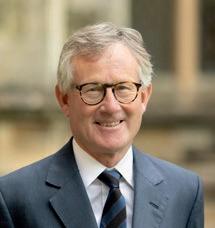
Robin, an OM and son of an OM, qualified as a chartered accountant with KPMG, and has over 35 years of private equity and banking experience. He has been the CFO and subsequently a NED and Chair of a number of quoted and unquoted companies in the fund management, media and leisure sectors. He is also a trustee of the Sports Council Trust Company.
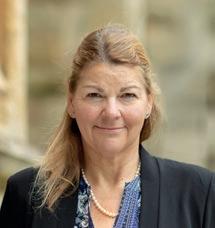
Sue grew up in the College as her father was Housemaster and subsequently Second Master. She was educated at Ellerslie School before it merged with the College. Following an MA in Educational Management and 10 years in Commerce, she joined the independent school sector initially as a School Bursar and then on the academic side in a range of prep, GSA and HMC environments. Sue joined the Independent Schools Inspectorate in 2011 and is now a Lead Inspector and educational consultant.
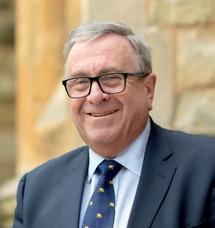
An international commercial banker, Carey worked for Standard Chartered Bank for 34 years in various countries including Hong Kong, Sri Lanka, Botswana and South Africa. He is currently an Independent NonExecutive Director in the City of London. He has been a Magistrate since 2007 and is the father of an OM.

An OM, Timothy is the nephew, brother and father of OMs. After Cambridge he read for the Bar and is head of chambers at 4-5 Gray’s Inn Square, where he practises. He has been in silk for more than 25 years. He is a bencher of Gray’s Inn, a deputy High Court Judge, a judge of the Court of Appeal of the Falklands, a Recorder of the Crown Court and an Election Commissioner. Although he achieved no distinction in the game at school he regularly plays rackets and follows Malvern rackets closely.
» Management Board (Chair)
» Malvern College School Board
» Nominations Committee (Chair)
» Remuneration Committee (Chair)
» Malvern College International Ltd Board
» Management Board
» Malvern College School Board (Chair)
» Nominations Committee
» Remuneration Committee
» Malvern College International Ltd Board
» Malvern College Enterprises Ltd Board
» College Guardians Ltd Board
» Management Board
» Abberley Hall (Chair) closed 30 June 2023
» The Downs Malvern (Chair)
» Malvern College International Ltd Board (Chair)
» Nominations Committee
» Remuneration Committee
» Audit Risk & Compliance Committee
» Malvernian Society (Chair)
» Foundation & Property Committee (Chair)
» Management Board
» Malvern College School Board
» Nominations Committee
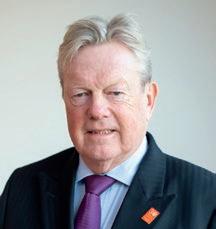
A qualified accountant, Tom has 30 years of experience in financial services holding board positions at FTSE 100 companies, including 10 years at the Prudential Group as Head of Audit for Prudential UK & Europe, Head of Audit for M&G Investments and Chief Risk Officer for Prudential UK & Europe. He was previously Head of Audit of Willis Group, Head of Compliance & Risk of Charles Schwab and Group Compliance Officer of HBOS Clerical Medical.

Andy Collins is currently Second Master at Dauntsey’s school in Wiltshire, following his role as Assistant Head Pastoral and Designated Safeguarding Lead at Millfield School. Andy was educated at King Edward’s School, Bath and with a first degree in History, took a Diploma of Social Anthropology at Lincoln College, Oxford, where he held a Major Stanley Scholarship and was awarded two Blues, before spending seven years as a professional rugby player. Andy joined the College Council in 2022.

Charles is an OM and the grandson of an OM. Following 23 years in wealth management with Albert E Sharp, Gerrard and Barclays, in 2017 he founded a public affairs consultancy, Facultas Associates. He serves or has served as a Trustee of: AGBIS, the Conservative Agents Superannuation Fund, the English-Speaking Union and the City of Birmingham Symphony Orchestra (and sings in the CBSO Chorus). He is a Fellow of the BritishAmerican Project, an elected member of the Board of the Conservative Party 2007-2011, chairman of the CCHQ Finance & Audit Committee 20092015 and was appointed an OBE for voluntary political service.
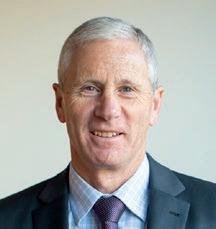
Roger joined the College in 1994 from The Manchester Grammar School and became Housemaster of No7, Director of PE & Sports and Head of Football. He was Coach to Southern England’s Under 19 ISFA and Chairman of Hereford & Worcester Schools Athletic Association. An ISI team inspector, he was Headmaster of Heathfield School for 10 years, a governor of Gosfield School, formed the partnership to create the Heathfield International School, Bangkok and was ISA National Ambassador for Sport.
» Audit Risk & Compliance Committee (Chair)
» Safeguarding Committee (Chair)
» Malvern College School Board
» Foundation & Property Committee
» Malvernian Society Trustee
» Malvern College School Board
» Safeguarding Committee
» Abberley Hall
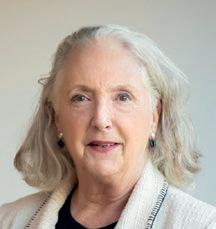
Christine is the Director of Alumni Relations at the University of Oxford. Before arriving at Oxford, she amassed more than 30 years of experience in alumni relations at Harvard University. Most recently, she worked at Harvard Business School where she oversaw the School’s alumni outreach and fundraising activities. Educated at Connecticut College in the US, Christine graduated with a BA in Asian Studies.
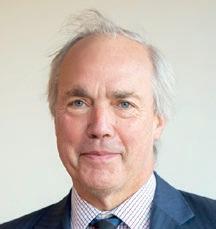
An OM and son of an OM, Paul graduated from Pembroke College, Cambridge in Classics, Archaeology and Anthropology. Paul has worked in the City since 1979 at various banks but principally at SG Warburg (later UBS Warburg). He has been the Chief Executive of Hoare Govett (owned variously by ABN Amro, RBS and now Jefferies) and since 2006 has been its Chair.
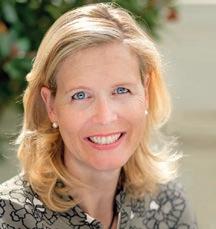
Louise has spent 30 years as an educator, living and working in Europe, the USA and Asia. A former Head of a bilingual school in Switzerland, she now has her own company offering leadership development and coaching. Originally trained as a teacher at Cambridge University, she has an MBA and has worked as a consultant developing leaders in larger organisations. Louise is married to an OM and is the parent of three OMs.

An OM, Dominic is one of Britain’s best-known historians. After studying at Oxford, St Andrews and Cambridge, he became a lecturer in history at Sheffield before pursuing a career as a freelance writer. He is the author of a series of bestselling books on Britain from the 1950s to the 1980s, has written and presented numerous documentaries for the BBC and presents the podcast, The Rest is Politics. He has been a Senior Fellow at Oxford’s Rothermere American Institute and is now Visiting Professor at King’s College London. He is also a regular columnist for the Daily Mail and BBC History Magazine, and writes book reviews for the Sunday Times.

An OM, Ben read history at Trinity College, Cambridge before qualifying as a solicitor in 2002. Having worked with law firms and in the City of London and Milan, he currently practises corporate and commercial law, specialising in the oil and gas sector.

Andrew was Headmaster of St Peter’s School, York and Warden of St Edward’s School, Oxford. On his retirement from teaching, he became a director of the leadership development and recruitment company, Aspirance and also has a private development coaching practice. In addition, he is the educational adviser for the Sons and Friends of Clergy and a member of the advisory council for the Winston Churchill Memorial Trust.

Catherine is the Director of Education for the College of Social Sciences and a Professor of Public Management and Leadership in the Institute of Local Government Studies at the University of Birmingham. She has a background as a policy maker and practitioner in public service and as such has a particular research interest in developing research which can deliver change within the public sector. Her research-informed areas of interest include developing the public service workforce, leadership and the integration of health and social care.

After reading law at University College London, Stuart has been a commercial property lawyer for nearly 40 years, initially in the City of London and for many years as a partner and now a consultant in two large Bristol law firms. His son and two daughters were educated at Malvern College, his youngest daughter also at The Downs Malvern where Stuart has been a Governor since 2011. He joined the College Council in March 2022 and is also a member of its Foundation and Property Committee.

An OM, Kaspar is a founder of KKA Partners, a Berlin-based private equity firm that invests in leading companies in Germany, Austria and Switzerland – the so-called “Mittelstand”. He started his career as a M&A banker at Citigroup in London and New York, gained his MBA in the US, and undergraduate degree in Scotland and California. He sits on the board of the HBS Alumni Association of Germany.

Neil is not a Trustee but serves on the Audit, Risk & Compliance Committee. Neil is a Vice Chairman of Deloitte Consulting and leads the firm’s relationship with several FTSE 100 organisations. A Chartered Accountant, he specializes in technology enabled finance transformation projects that embrace organisational, process and people related change. Neil’s industry experience is centred around travel, hospitality and services. Outside Deloitte, Neil is also a Governor of Birmingham City University.
From November 2022 The Downs Malvern fully merged into the Corporation of Malvern College. The Downs Malvern Board continues to have oversight of matters academic, pastoral and safeguarding. The Board meets once per term and reports through to the Corporation of Malvern College Management Board and Council. Bringing the governance of The College and The Downs closer together is already allowing for greater agility and collaboration.
» Audit Risk & Compliance Committee
A Council Management Board, made up of up to 6 trustees provides executive, strategic and financial oversight.
There are separate Council sub-committees for: (i) Audit, Risk & Compliance (ARC); (ii) Foundation & Property (F&P); (iii) Nominations; (iv) Remuneration. The ARC, F&P and Nominations Committees meet termly, and the Remuneration Committee meets once per year.
There are separate boards accountable to the trustees as follows:
1. The Malvern College, The Downs Malvern and formerly the Abberley Hall (now closed) School Boards primarily focus on education, pastoral and safeguarding matters.
2. There are company boards for Malvern College International Limited, Malvern College Enterprises Limited and College Guardians Limited.
3. There is an independent and separate board of trustees for The Malvernian Society.
The formal line of contact from individual Council members to the College Head is normally via the Chair of Council or the Chair of the Malvern College Board, and to The Downs Malvern Head is normally via its Board Chair. The Chief Operating Officer (COO) and Clerk to Council is the Council members’ first point of contact for all matters relating to the governance of the College and each prep school, and for any queries about Council business.
A committee of Council, the Management Board, comprising up to 6 Trustees, the Headmaster, the Chief Operating Officer, the Senior Deputy Head, the Finance Director, the Director of Malvern College International and the Headmasters of The Downs Malvern (TDM) and Abberley Hall (AH) now closed, meets at least once per month in term time. All major developments and decisions are presented to the College Council having first been deliberated by the Management Board.
The Malvern College Board meets once per term, focusing on the DfE’s Independent School Standards (ISSR) and the Boarding Schools: National Minimum Standards (NMS) relating to academic, pastoral and safeguarding matters.
The Malvern Executive Team (MET), chaired by the Headmaster, meets every two weeks to review matters that affect all entities in the family, and wider strategic direction, drawing on other expertise throughout the College and Prep Schools as required. The Malvern College Senior Leadership Team (SLT, formally Senior Management Team), chaired by the Headmaster, meets most weeks. The Headmaster, who has overall day to day responsibility for the management of the College, consults with the SLT before making recommendations to the Management Board and ultimately to the College Council.
The Audit, Risk and Compliance Committee meets at least three times per year and consists of two members of Council and an independent member appointed by Council. This Committee scrutinises the College’s Annual Report and Financial Statements, its financial procedures and internal controls, and compliance (e.g. H&S and data protection). The Committee oversees the relationship of the College with its external auditors, formally reporting to the College Council. This Committee also reviews the Risk Register and management’s procedures for review of the Register.
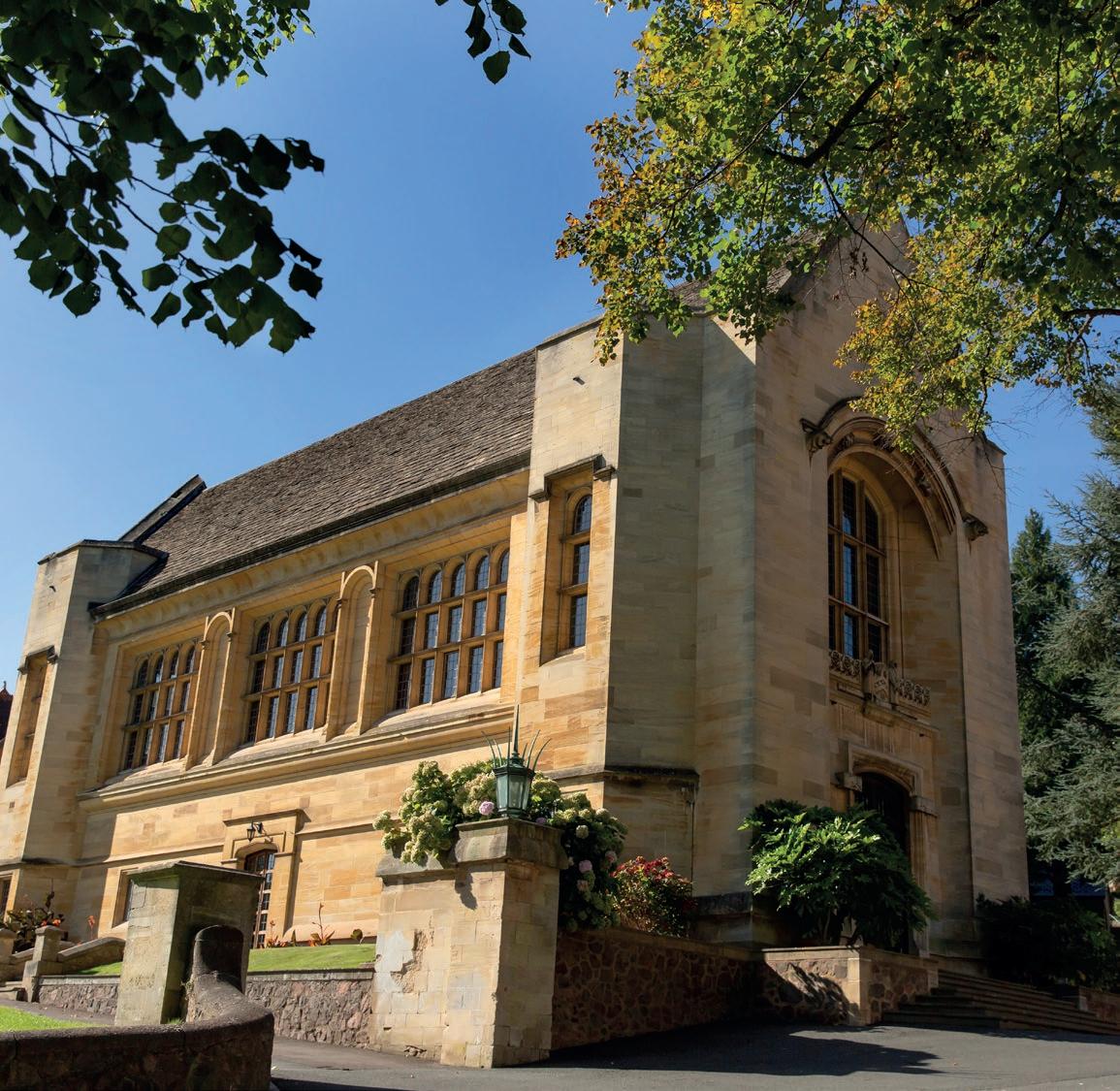

The remuneration of the Key Management Personnel is discussed in detail each year by the Remuneration Committee, with awareness of industry standards, and is approved by the full College Council.
The appointment of Council members and membership of the Committees are both identified and reviewed by the Nominations Committee.
The Foundation and Property Committee meets three times per year to review investments and property holdings of both the College and the Malvernian Society.
When a Trustee vacancy arises, the criteria of skills required, availability and eligibility, as dictated by the Royal Charter, are identified and reviewed by the Nominations Committee. The College’s elected Trustees are appointed following the recommendations of both the Nominations Committee and the full Council. Trustees are appointed to serve typically for up to a 5-year term and typically retire after a maximum of three terms.
Induction for New Trustees is co-ordinated by the Clerk to the Council. All new Trustees receive an induction pack comprising Charity Commission Trustee information, DfE publications, Malvern College Annual Report and Accounts and extensive College information. Training is undertaken through the completion of on-line safeguarding training and attendance at College-organised Trustee training events as well as through attendance at Council meetings and by interaction with fellow Trustees. A record of training is maintained for each Trustee.
As the College is a not for profit organisation which aims to follow charity sector best practice, the Trustees, via the Audit, Risk & Compliance Committee have familiarised themselves with the updated version of the Charity Gover nance Code (the “Code”) published in December 2021. The Committee considers that the College’s governance framework does align with many but not all aspects of the Code. A review of the Code was conducted in 2022 and no changes to the College’s governance and standards were deemed necessary.

Keith was educated at Monmouth School and Downing College, Cambridge, where he read Geography, and came to Malvern College from Harrow School where he served as the Deputy Head Master. As well as overseeing the day-to-day running of a school, he has held a number of positions in his career including: Housemaster, departmental head, ISI school inspector, coach of various sports, and Master in charge of the Duke of Edinburgh’s Award programme.
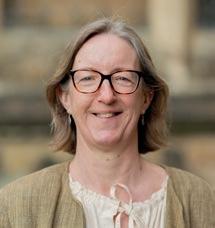
After working for four years in the City of London in domestic and corporate banking during the late 1980s, Sarah went to Cambridge University to read Economics at Lucy Cavendish College. After graduation, she took her PGCE in Glasgow. Having been Head of Economics at Eltham College from 1994-1998, as well as being involved in school expeditions to Iceland, Norway and Nepal, Sarah then moved as Housemistress to Trinity School in Teignmouth, Devon, where she became Head of Sixth Form. She arrived at Malvern College ten years later as Housemistress of the newly-built Ellerslie House and was appointed Deputy Head (Pastoral) in 2011. In 2017 Sarah was appointed Senior Deputy Head.
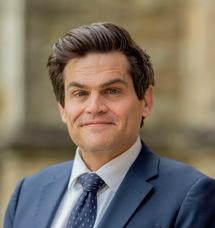
Rob graduated from St Catherine’s College, Oxford and has built a wealth of experience through his early career at Procter & Gamble and WPP, before moving to Kenya as Commercial Director (Bursar) of Pembroke House School and subsequently as Chief Operating Officer at Ol Pejeta Conservancy. Prior to joining Malvern College, Rob spent five years on the Senior Leadership Team of Nord Anglia Education working with international schools across Europe and the Middle East. Rob is enjoying returning to boarding school life having had some happy memories from his own experiences in a British boarding school in his formative years.

Lewis Faulkner studied Biological Sciences at Lady Margaret Hall, Oxford before completing his PGCE at New College, Oxford. His first teaching post was at Sale Grammar School where he helped to introduce the Duke of Edinburgh Award Scheme. He then taught at St Edward’s Oxford for nearly fourteen years where he was Head of Biology and then Housemaster of a boys’ boarding house for seven years and, latterly, Senior Housemaster. He also has an MA in Education at Oxford Brookes University.
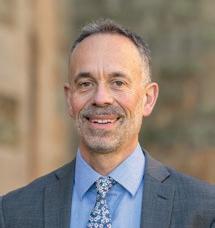
Stephen Holroyd studied Economics and Economic History at Leeds University before completing his PGCE at Warwick University. He joined Malvern in 1990 and during his time at the College he has taken on a variety of roles parallel to his Economics teaching including Deputy Housemaster, Stage Manager, in charge of Duke of Edinburgh’s Gold Award, Head of Boys’ Hockey, Sixth Form tutor, IB Workshop Leader, Senior Examiner and author. His most recent roles have been Head of Economics, Politics and Business, and IB Diploma Coordinator. He is also an ISI School Inspector and has held several Prep School Governing roles.
Penny Bijl Head of Learning Enhancement / Designated Safeguarding Lead
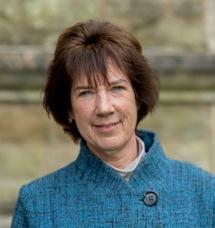
Penny trained originally as a teacher of English (1986) with undergraduate degrees from Reading and Cambridge. She then gained an M.Phil in Psychology of Education, also from Cambridge, in 1987 and took her MA in 1990. After completing management training with the NHS, she worked as a Contracts and Planning Manager at Kidderminster NHS Trust for 3 years. She then returned to teaching, initially in the state sector, and joined Malvern College in 2004 in the Learning Enhancement department, subsequently also teaching English to IB, GCSE and in the FY for several years and TOK for two years.
Natalie Roberts Director of Finance
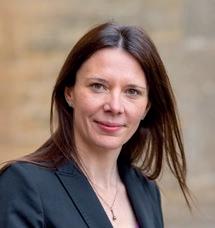
Natalie graduated from the University of York with a degree in Philosophy, Politics and Economics. After beginning her career at KPMG where she qualified as a chartered accountant, Natalie has since worked in variety of finance roles in the not-for-profit and local government sectors. These include the Grammar School at Leeds and, latterly, Westminster City Council where her focus was on commercial, capital and strategic projects.
Kate Tripp Director of Human Resources

Kate joined Malvern College in 2011 as Head of Human Resources and became Director of Human Resources in 2019. She is a Fellow of the CIPD, has a degree in Applied Social Studies from Sheffield Hallam University and an MA in Human Resources Management from Oxford Brookes University. Prior to joining Malvern, Kate was Head of Organisational Development for a Housing Association and prior to that held a variety of Human Resources roles in the charity and banking sectors.

Andy joined The Downs Malvern in May 2022. Before taking over the Headship at The Downs, he was Deputy Head at Windlesham House School in Sussex. Andy graduated from Imperial College London with a degree in Zoology, completed his PGCE at Bath University and also holds an MEd in Educational Leadership and Management from Buckingham University. Before joining Windlesham House, Andy taught at Cheam School and spent four years at The Banda School in Nairobi, where he met his wife Polly. Andy’s leisure time is focused on the outdoors: he is a keen cross country runner, enjoys fly fishing, looking after the family’s chickens and quail and gardening with his two young children, to list a few of his interests.
All fundraising activities for the College are carried out by highly professional College staff with assistance from the Malvernian Society, alongside the parents and pupils with the running of specific fundraising events. The College does not use external professional fundraisers or have any commercial participators. All fundraising activities report in to the Chief Operating Officer, are monitored by the Headmaster, and are overseen by the members of the College Council.
No complaints relating to fundraising activities have been received by the College during the financial period. However, the College has in place procedures that would be followed in the event of a complaint being received with the initial response being the responsibility of the Chief Operating Officer. Any continuing issues would then be passed to the College Council to determine what further action might be required.
The College does not currently subscribe to any specific fundraising standards or schemes for fundraising regulation but considers that it has set appropriate standards for the operation and management of its fundraising activities. In particular, the College considers that its processes and controls ensure that vulnerable people and other members
of the public are protected from any unreasonable intrusion of their privacy and that no fundraising activities would be unreasonably persistent or place undue pressure on a person to give money or property.
The Council, as Trustees of the Charity, has examined the principal areas of the College’s operations and considered the major risks faced in each of the risk areas by reviewing the Risk Register prepared by the College’s SLT. It is the opinion of the Council that the College has established resources and reviewed systems which, under normal operating conditions, should allow these risks to be mitigated to an acceptable level in its day-to-day operations.
Risks are recorded on the College’s Risk Register. The Council formally reviews the Risk Register on an annual basis. Changes to the College’s risk profile are monitored and controlled on an operational basis by the College’s SMT, the Operations Management Team and the Health and Safety Committee. These bodies report specific identified risks and the strategies for managing those risks to the Audit, Risk & Compliance Committee, the College Management Board and Council.
The key controls used by the College include:
» Formal agendas and papers for all Committee, Management Board and Council meetings, with detailed minutes taken for each;
» Clear and detailed terms of reference for each Committee;
» Comprehensive strategic planning, budgeting and management accounting;
» Established organisational structures and lines of reporting; and
» Trustees who have designated responsibility for child protection and health and safety.
The Trustees believe that the College’s financial resources and contingency planning is sufficient to ensure the ability of the College to continue as a going concern for the foreseeable future, being at least twelve months from the date of approval of these financial statements.
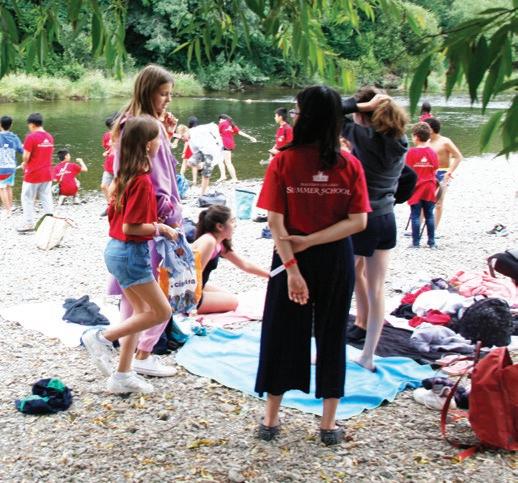




Malvern College Enterprises Limited is one of the College’s wholly owned trading subsidiaries and carries out non-charitable trading activities for the College. The results of MCEL are consolidated within the overall College results. Further details of MCEL’s activities and performance are given in the Financial Review and Note 5 and Note 26 of the Financial Statements.
In September 2021, the guardianship business was devolved from MCEL and was incorporated as College Guardians Limited. It has the same board of Directors as MCEL and is a wholly owned trading subsidiary of Malvern College. Further details of CG’s activities and performance are given in the Financial Review and Note 5 and Note 26 of the Financial Statements.
Malvern College International Limited (MCIL) is one of the College’s wholly owned trading subsidiaries and carries out the trading activities of the International Schools. Further details of MCIL’s activities and performance are given in the Financial Review and Note 5 and Note 26 of the Financial Statements.

The Downs Malvern (TDM) is the trading name of The Downs, Malvern College Prep School. The merger of TDM into the Malvern College entity took place on 1st November 2022. For the 2022-23 financial year the results of The Downs Malvern are consolidated within the overall College results for the 9 months period from 1 November 2022 to 31 July 2023.
Abberley Hall is the trading name of Abberley Hall Limited (AH), a prep school located in North Worcestershire, educating approximately 160 children aged between 2 and 13. As at 31 July 2023, the College had provided AH with £3.7m of grant and loan funds for working capital and investment support with an undertaking to provide additional funds of £1.3m, i.e. a total of £5m, with a first fixed charge over the freehold properties of the school and surrounding estate.
The compounded effect of the economic climate and challenging prep school market negatively affected its cash flow position. Malvern College made the difficult decision that it would not provide further funding post the 2022-23 academic year. The Governors explored an extensive range of options including approaching private school groups and direct funding from a group of parents. An announcement of potential closure was made at the beginning of the Lent term 2023 and a consultation process was undertaken with staff. An Abberley Hall Parent Group was formed who went to great efforts to fundraise for the School, in an effort to keep the school open, however given the extent financial and operational investments required, a longterm arrangement was sadly unsuccessful. As a result, the School closed at the end of the summer term.
The results of AH for the year to 31 July 2023 are consolidated into the 2023 results of Malvern College because, whilst the school is a separate charity, the College has control of the Board of Governors. Further details of AH’s activities and performance are given in the Financial Review and Note 5 and Note 26 of the Financial Statements.

Giving back, looking forward
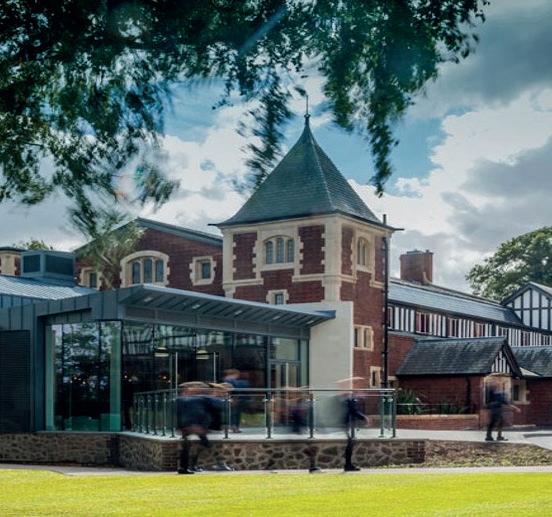
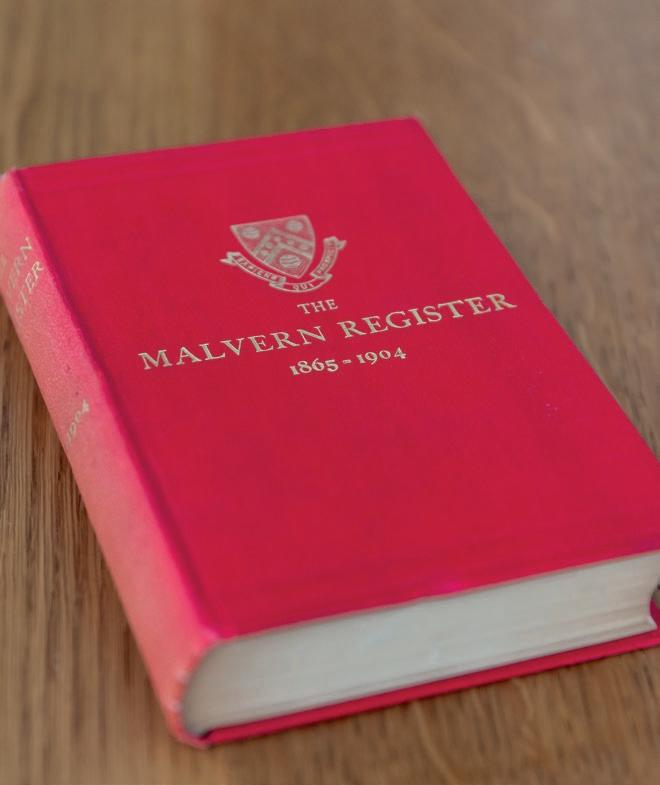
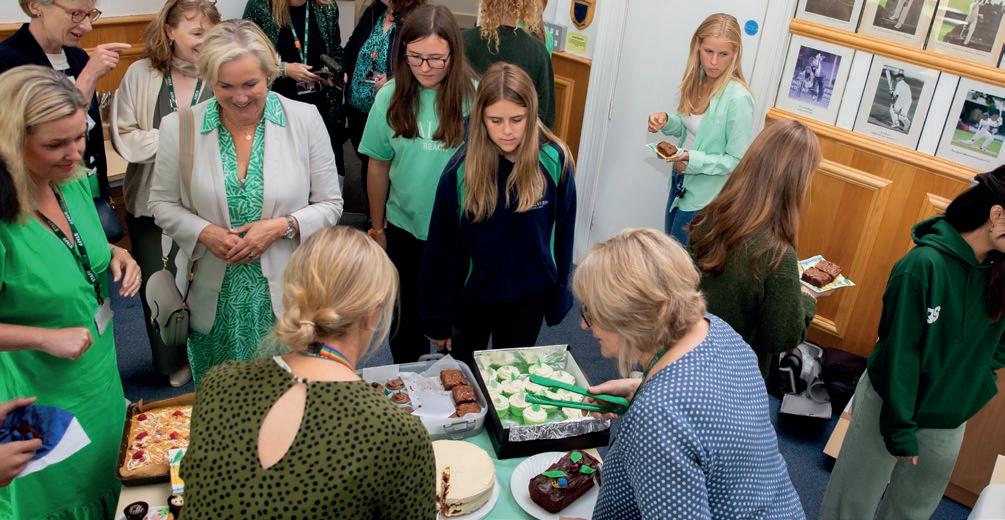
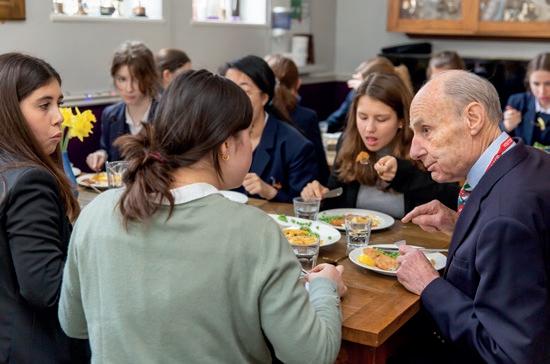
The Malvernian Society Limited is a company limited by guarantee, which promotes the work of, and education at Malvern College, assists in fund raising and in cases of need, assists pupils in providing bursarial and/or scholarship support. In the year to 31 July 2023, the Malvernian Society generated net income of c.£0.2m and held net assets of £16.8m. The results of The Malvernian Society Limited are not consolidated with the results of Malvern College because the Society is a separate charity with an independent Board of Directors. The College receives annual grants towards the cost of scholarships, exhibitions, bursaries alongside ad hoc grants for specific projects from The Malvernian Society. See Note 26 of the Financial Statements for further details.
In August 2021, the employees of the Malvernian Society were TUPED across to Malvern College in order to bring the fundraising and development office functions under the oversight of the Chief Operating Officer but remain accountable to the Trustees of the Society.
Council members do not receive any remuneration in the performance of their duties but are related parties of the College. See Note 9 of the Financial Statements for details of applicable transactions during the year.

Our latest ISI Inspection rated Malvern College as excellent for both pupils’ academic achievement and for the quality of pupils’ personal development.
Safeguarding arrangements under the new governance structure have rolled out over the course of 2022/23. The Council has delegated oversight for Safeguarding and Child Protection to the Malvern College Board (the “Board”). One member of the Board is responsible for the oversight of safeguarding arrangements, Mr Andy Collins, Safeguarding Governor, and he regularly updates the Council on its work. The Safeguarding and Child Protection subcommittee has been meeting termly in 2022/23 to review the relevant policies, plans, and procedures in place. It is attended by the safeguarding Board member for each of Malvern College, The Downs Malvern, MCIL, MCEL and College Guardians. Pupil Mental Health concerns have continued to be at the top of the list of safeguarding concerns.
In response to the rising pressure on our counselling service (and the increasing difficulty in getting referrals to CAMHS accepted), 2022/23 saw the integrated counselling model successfully established. Our full-time counsellor is fully occupied supporting pupils but has also provided a peer support and advice space for House Assistants who carry a lot of pastoral responsibility. She is able to advise all staff on, for example, recognising and responding to selfharm, and is a valued member of the Pastoral Team, supporting CAMHS and psychiatric referrals.


There has been continued focus on pupil wellbeing this year, with the embedding of the integrated counselling model and the introduction of regular wellbeing screening questionnaires for all pupils. These questionnaires have been designed by our College Counsellor and have been adapted from the YP CORE questionnaire which is used as a screening tool by professionals. The results are seen by the College Counsellor, Lucy Davies, and relevant information is acted upon by Lucy and the pastoral and safeguarding teams.
Listening to pupil voice is a core part of our pastoral care. We carry out a regular pastoral survey for pupils and the Pupil Thrive group meets regularly to discuss issues with senior staff. Pupil feedback has encouraged us to replace weekly Sixth Form Life Skills lessons with a termly Sixth Form Life Skills Day. This has been discussed and planned during 2022-23 and will be implemented during the next academic year. We continue to embed the Life skills programme into the curriculum, and we have benefited from many good guest speakers and workshops. This has been complemented by evening Life Skills talks and webinars for parents, so that they are kept informed of the Life Skills programme and so parents feel appropriately equipped to discuss these topics with their children.
There has been continued emphasis on continuing professional development for pastoral staff. We held a very useful ‘sharing good practice’ exchange with pastoral staff at Repton. They spent a day with us, and we spent a day visiting their boarding houses, touring their campus and discussing pastoral issues with their Housems and other pastoral staff. There are now regular training lunches for Deputy Housems and House Assistants with different themes, case studies and guest speakers. Housems attended a risk assessment training day (which doesn’t sound inspiring but was actually very useful!) and Housems also attended a bespoke Level 3 Safeguarding day. We have encouraged more integration with The Downs Malvern; Houseparents from The Downs attended College Housem meetings and we organised visits and sharing good practice, such as the CPOMS software system for recording and sharing pastoral and safeguarding information.
A major project for the pastoral team was the introduction of a new school uniform for September 2023. During 2022-23 we went through the final stages of consultation with parents, pupils and staff with the design of the new uniform. The new school uniform was three years in the making and from initial sketches and fabric samples to the final collection available today, collaboration with our community was at the centre of the project.

Pupils’ commitment their community itself in their for one another.

Early ideas came from pupil A-level Design and Technology textiles projects, and from fashion designer Milly Wall (OM. No. 3). Ideas were refined through extensive consultation with pupil groups, staff input, and Parents’ Forum. Whilst developing the new uniform we focused on a modern uniform that offers quality, comfort, individuality, choice and environmental credentials. We appointed Schoolblazer Ltd as our new uniform provider and the new uniform items are now available to purchase via their website. It brings together our heritage and ambition, whilst also appropriately reflecting wider societal changes.
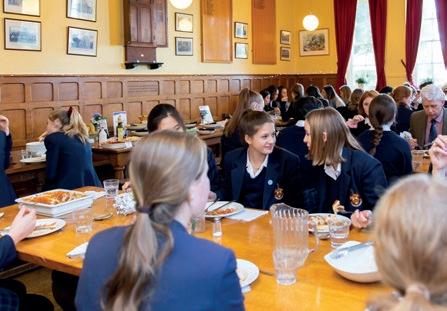
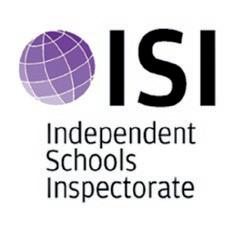


2023 was the first year since 2019 where pupils sat public examinations without any special measures being applied to either the nature of the final examinations or what the pupils were expected to have learned. In previous years we have had the experience of CAGs (Centre Assessed Grades), TAGs (Teacher Assessed Grades), reductions in syllabus content and changes to the format of the final examinations. This year saw a return to the pre-pandemic exams regime and a much-publicised tightening of standards from the exam boards. This was, for all of cohorts, their first experience of sitting formal public examinations. As a result, comparisons to 2020, 2021, and 2022 are largely meaningless and so we are looking at 2019 as being our benchmark.
The IB cohort achieved an average score of 35 points which is above the global average of 30.2 points. It is also above the UK National Average score of 34.67, which given that the IB is only done by highly academic independent and maintained school is a useful marker for us to judge ourselves against. Maybe more impressively this equates to an average UCAS Tariff of 203 points which is the equivalent of A*A*A*C or A*A*AA.
That average score of 35 points compares to our 5-year rolling average of 36.79 so does represent a dip when compared to previous years.
Despite the reports in the press, our A-Level pupils have achieved a better set of grades to those from 2019, the last pre-pandemic set of results that we have. Considering that this is a cohort who have never done public exams before, the results are better than we had feared they might be. There has been a dip when compared to the five-year rolling average, but given that the previous 3 years had had either Centre Assessed Grades, Teacher Assessed Grades or slimmed down syllabus contents this was a good set of grades, especially when many of our most academic pupils take the IB Programme.
29% achieved A*/A grades
61% achieved A*– B grades
82% achieved A*– C grades
Overall, the GCSE results were down this year and represented, on the face of it, a relatively weak set of grades. 52% of the grades were between 9 and 7 which represents the old A*/A grades. This compares against our 5-year rolling average of 62%, though the inflationary impact of CAGS and TAGS must be factored into this.
Despite what was widely regarded as being a difficult year for pupils doing IB and A-Levels the outcomes in terms of their university destinations remained very positive. 75% of pupils got into their first choice with 54% going to Russell Group Universities. Malvern has sent pupils off to 10 of the UK’s top 12 Universities including Imperial, LSE, Durham, Edinburgh, and St. Andrews.
An increasing number of pupils are applying to overseas universities with 14% doing so this year. Malvern pupils have gained places at a wide range of top-ranked European and North American universities including McGill, Columbia, and Northwestern.
The 2023 cohort are going off to study 70 different courses at university with the most popular choices being Business Management, Economics, Engineering and Psychology.
19% of pupils have chosen to take a gap year.
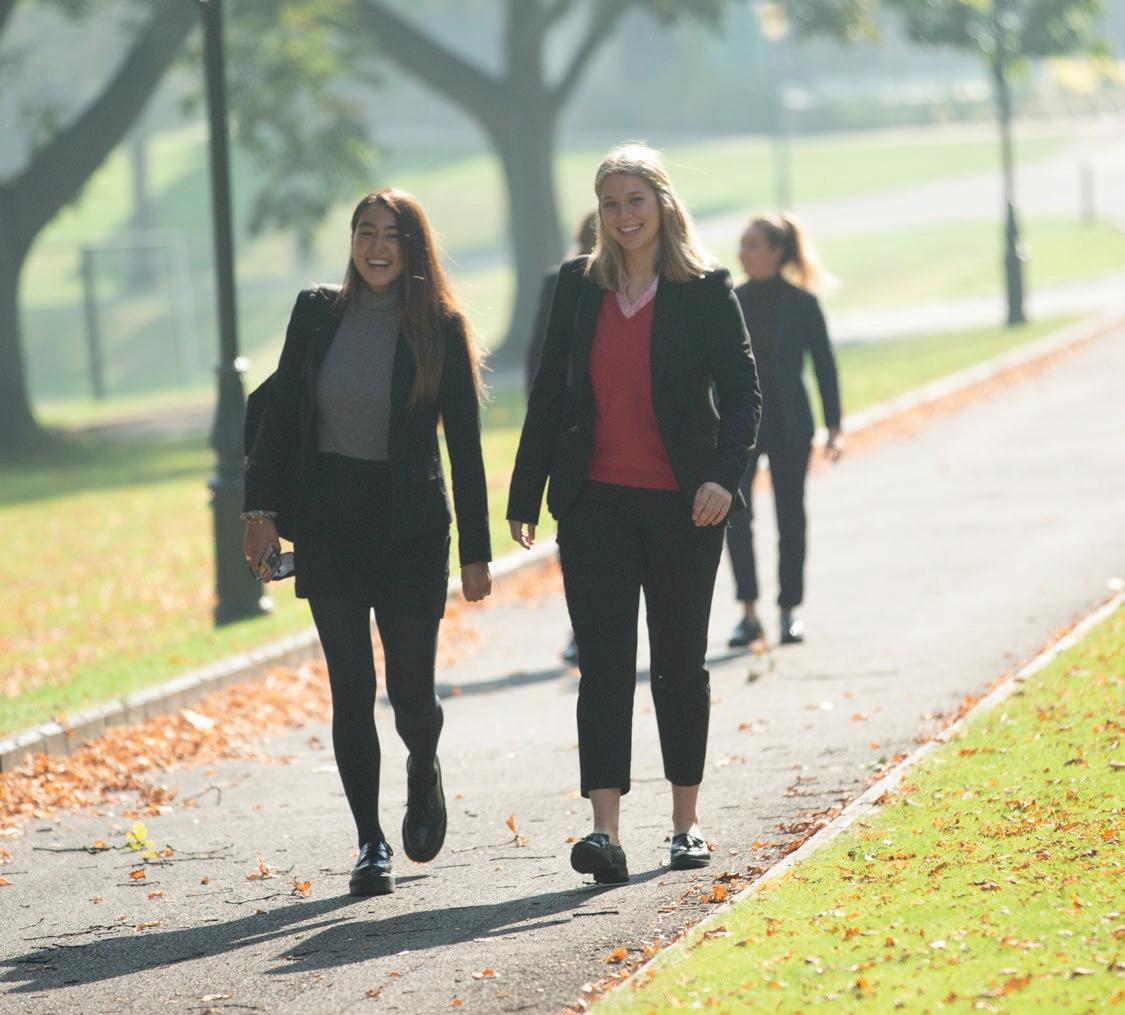
Malvern
took
at 5 out of the top 10
universities
QS World Rankings, 2022 Cohort
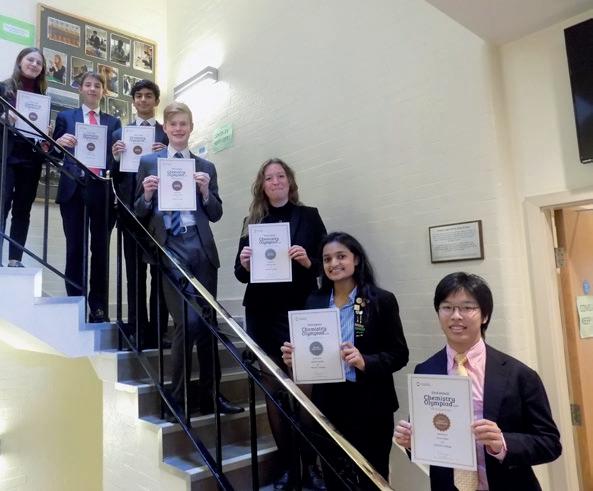




Beyond the core curriculum, we encourage pupils to broaden their intellectual horizons as well as their independence, collaborative research and engagement, through the pupil led super-curriculum that allows our pupils to individualise their own curriculum. Academic competitions, intellectual pursuits and pupil-led societies all provide opportunities for pupils to stretch themselves and challenge each other. There have been a number of achievements across the whole spectrum of subject areas:
In national level Olympiads across the Sciences and Maths there have been significant numbers being awarded medals and commendations for example in the Senior Maths Challenge Malvern pupils were awarded 7 Gold, and one pupil qualified for the British Maths Olympiad. Across the three science Olympiads and Challenges pupils were awarded 18 gold awards, with well over 100 awards in total.
As well as societies that link directly to the academic curriculum (e.g. Psychology, Economics and History societies), a range of societies that have a broader focus or look forward to future careers (e.g. Politics and Foreign affairs, Women in STEM and Med Soc) thrive. Pupil run groups that focus on wider society, human rights, responsibilities and identities including Black Students Union, LGBTQ+, Amnesty International and Empower Her Voice give pupils further platforms and opportunities to respond to and explore current affairs, issues and events.

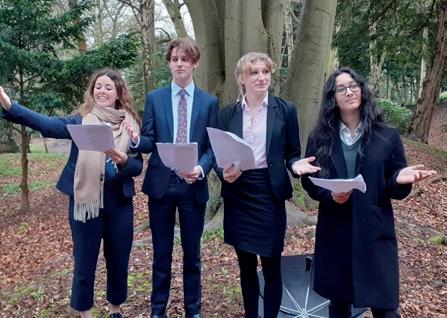


The Aston Society (junior school academic society) finished the year with a “conference” in the Lewis Lecture Theatre and Foyer. Sixty Year 9 to 11 pupils had been researching individual projects and presented them as talks, a podcast, or academic posters. A variety of topics – from dementia in pets to random numbers, Raphael’s tapestries to social media research and extraction of essential oils captivated their audience.
The Wheeler-Bennett Society (upper school crosscurricular academic society) gives an excellent opportunity for our Upper Sixth pupils to research and present on an outstanding range of topic and it is a extremely popular society amongst all out senior pupils. All talks see our Lewis Lecture Theatre full of pupils listening keenly and enjoying the question-and-answer sessions that follow on from each talk. Of course, all pupil organised and run. Recent talks have been:
» Provably unprovableGödel’s incompleteness theorem
» Apophis - the asteroid that will NOT hit earth (or at least not any time soon)
» From Lab to Market: Revolutionising the ivory trade
» Is the fate of human society predetermined?
A new academic scholars publication ‘Sapiens’ gave a number of scholars the opportunity to publish in-depth academic research across and beyond our curriculum.
With strong connections to writers such as CS Lewis and JRR Tolkien, the College has a vibrant Literary Society and its offshoot group: “Writers’ Inc.”, which is Malvern College’s club for keen and ambitious creative writers, be it poetry, plays, fiction, or non-fiction. A highlighted achievement included an Upper Sixth pupil publishing Away through BookLeaf publishing. She wrote her poems on the brink of the Russian and Ukrainian war, and during her trial exams. A preface, dedication and cover design were added to complete the publication.
In Art, an Upper Sixth Art Scholar was awarded winner of the Best Artwork Project by the BSA Supporting Excellence Awards. Five pupils received ‘Top Performer’ awards from the OCR Examination Board following this year’s results. Two for achieving 100% in their GCSE work and three for achieving 100% in their A level. A Lower Sixth Photography student was selected as a featured ‘Photographer’ for ‘Leica Camera Store’ India and also had an exhibition of her work at the Hadehra Art Gallery, New Delhi and were featured a range of publications.
In Hockey both our U16 boys & U18 girls qualified for the Regional Indoor Finals and the U16 girls reached Round 4 of the National Tier 1 outdoor competition. Our Girls 1st XI captain played National League hockey, and many of our pupils achieved great successes in their selection into various hockey performance pathways. Seven players were selected for the Talent Academy and five gained County recognition in their respective age groups.
In Rugby we currently have 15 boys involved with RFU academies, including the 1st XV Rugby captain being awarded England Academy Player status. This is the highest accolade that can be awarded at U18 level other than being capped.
It was an outstanding season for our Rugby 7s teams this year. Highlights include:
» Christ College Brecon U18 TournamentCup Quarter finals
» Collegiate School U18 Tournament CupWinners (Frankie Jefferies was awarded player of the tournament)
» North of England U18 Tournament - Salver Winners
» Rosslyn Park u18s Vase Quarter finalists (out of 250 schools)
» Kings School Worcester U16 Trophy Winners
Four of our senior boys have been playing academy u18 league rugby this term for the RFU Midlands West
side (formerly Worcester Warriors). Two played for the RFU Midlands West u17 team with two representing the U16 Midlands West Academy and one Lower Sixth player was invited to an England U17 training camp at Bisham Abbey.
Our football programme has continued to grow with competitive fixtures for both our boys’ and girls’ programmes. The Boys’ 1st XI football team secured a place in the last 16 of the ISFA National Shield. A year 11 pupil was invited to train with semiprofessional Worcester City Reserves.
This year has seen a significant increase in interest in Rackets with a rapid influx of girls playing too. Both boys and girls have been well represented at Queen’s. The new FY boys have also proved that they can play to a very good level. The likes of Ed Taylor, Hugo Hardinges and Ed Queen have shown real promise but latterly there have been many newcomers who will in time challenge for their places. The strongest pair were in the colts with one being 2nd seed at the National Schools tournament at Queen’s.
Netball highlights include U16/U18 Round 3 of the ‘Sisters in Sport’ plate competition, narrowly missing out on the quarter-finals but progressing further than in the past 4 years. The 1st VII recorded their first win in over a decade against Cheltenham College in the annual charity match as well as placing 3rd in the plate competition at the Collegiate Competition.
Our junior girls Tennis team, were unbeaten in the Hereford and Worcester LTA competition, winning their division.
In the County doubles competitions, both our girls and boys pairs were runners up in the finals and in the singles competitions both girls and boys made is through to all the knock out stages at both senior and junior levels.
In Athletics, the College had 28 pupils compete in the Malvern District Athletics Championships, with 17 of our students qualifying for the county championships. One pupil won both the inter boys’ hurdles and long jump, and another won the junior girls 300m.
In the county championships, one pupil won the inter boy’s discus and placing third in the inter boys shot putt, and another was placing in his three events.
The Girls U18 team Cricket team made it through to the 3rd round of the National Twenty20 competition. The Boys Cricket season began with a wonderful tour to Sri Lanka in April, in which all our players showcased their skills and sportsmanship, representing Malvern College with great pride.
Following our return, despite several games being affected by rain, our 1st XI achieved victories against Clifton, Bromsgrove, Denstone and Wellington.
Notable performances included Flynn Gunston (No.1) scoring his first 1st XI century against Denstone, and Tommy Boorman (No.2) taking 5 wickets against Monmouth.
13 pupils represented their counties and five senior player 2nd XI honours for their respective counties.
The 1st XI qualified for Finals Day of the National Twenty20 competition at Arundel Castle and this is the fourth time in a row that the College has successfully made it to the final day.
One pupil was picked for England U19 against Australia and made his Somerset First XI debut in the 50 over competition.
Whilst another was selected for the England Young Lions Invitational XI in August and one pupil represented the Midlands at the prestigious Bunbury Festival
In Drama the Musical Theatre Society presented a memorable production of ‘Les Miserables’, the Year 10 (Remove) performed the amusing contemporary ensemble play – ‘Bright. Young. Things’; Drama Scholars presented a vibrant stage version of ‘Shakespeare in Love’, Year 9 (FY) dramatists staged a wonderfully comic production of ‘The Secret Diary of Adrian Mole’. All productions featured powerful acting performances supported by impressive production values and were well received by appreciative audiences.
The much loved and fiercely contested House Drama Competition occurred over three
performance evenings in February, offering a rich variety of theatrical experiences. Productions ranging from ‘Peter Pan’ to ‘Lord of the Flies’, ‘The Woman in Black’ and ‘Matilda’ were presented on the Rogers Theatre stage with category winners receiving their trophies at a special ‘Oscars’ Ceremony.
One of our outstanding dramatists successfully auditioned to become a member of the National Youth Theatre and another was accepted onto the foundation acting course at the London Academy of Music and Dramatic Arts.
In Speech and Drama LAMDA examinations pupils attained 29 Merits and 14 Distinctions.
Two Remove Drama Scholars enjoyed performing in two plays at the Edinburgh Fringe Festival this summer, and a Lower Sixth Drama scholar, became a company member of the National Youth Theatre.
The Music programme was centred on variety of ensembles - Chapel Choir (comprising approximately 70 pupils) and the Chamber Choir, Concert Band, Jazz Band, Enigma Sinfonia, Chamber Orchestra as well as the smaller Brass and Percussion Ensembles.
190 pupils having weekly one-to-one lessons with our team of VMTs. The performance programme contained a mix of smaller solo concerts (both classical and popular genres) and the larger concerts showcasing the ensembles. It was noticeable that there was a greater engagement with the programme by performers and audience alike with an increase in the number of concerts and variety being scheduled.
The Concerto Concert was, as ever, a real highlight of the year with Music, this year, from JS Bach to Cody Fry. The Chamber Choir, once again, performed in the wider community, making its annual appearance in Great Malvern Priory as well as presenting a concert in the beautiful St. Mary’s Church, Ripple.
The two House music competitions – House Music (solo individual) and House Singing were, as ever, fiercely contested. The latter was held, once again, in the Malvern Theatres, with well over 500 pupils representing their houses, who each chose, arranged, rehearsed and performed their song to an 800-strong audience. As ever, the atmosphere was electric!
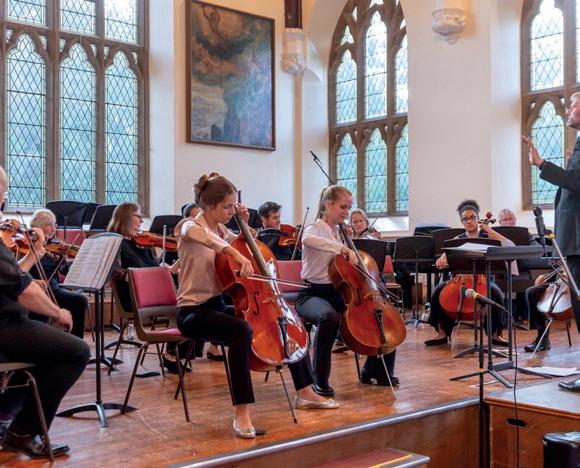
The Combined Cadet Force has always been a significant feature of the co-curriculum and has over 180 pupils taking part in the full range of weekly activities and frequent camps and competitions. An Upper Sixth pupil was awarded the Regional Commandant’s Award as recognition of his outstanding commitment to the RAFAC.
A significant number of pupils take part in the Duke of Edinburgh’s Award scheme throughout the school with pupils walking as well as using bikes, canoes, kayaks, rafts and SUPs for their expeditions. We had over 85 pupils undertaking Silver Award, with more than 50% of the 59 pupils who had signed up for the Gold Award completing it before they left the College.
Outdoor Pursuits (OP) clubs are a distinctive feature of the Malvern curriculum (white water kayaking, canoe polo, mountain biking, rock and indoor climbing and mountain scrambling) and all continue to increase in numbers and are fully subscribed. Ventures of note include paddlers running grade4 waterfalls, bikers pushing their limits on black trails and lead climbers taking on ever increasing graded climbs. ‘Hunted’ and ‘Lost’ continue to be phenomenally successful and popular events, with fierce competitions amongst the pupils to take part and represent their houses in what is now seen as regular annual events that are keenly followed by all pupils.



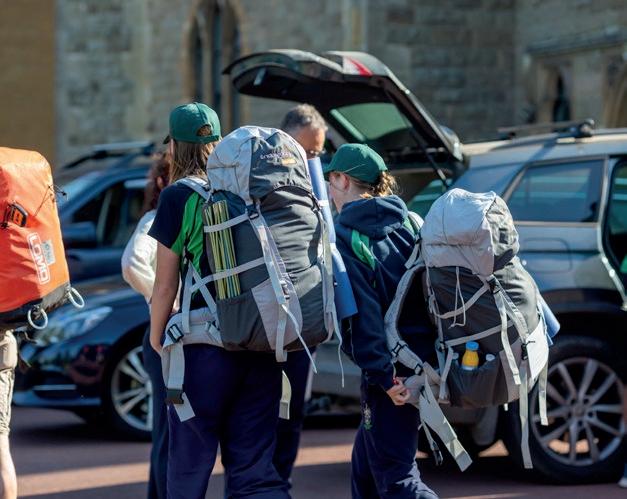
The Downs Malvern has enjoyed a very positive year with some notable achievements illustrating the strength and depth within the school community as changes have been made to modernise the school and look to the future of Prep School provision within the Malvern family of schools. The school received a clean bill of health in the ISI Regulatory Compliance Inspection in June which reflected the hard work that had gone into the school’s preparation. The in-year admissions were particularly healthy, beginning with a role of 176 and concluding the year with 196 pupils.
Academic: It has been another successful year of Scholarships with 14 of our Year 8 pupils achieving 23 scholarship awards between them. These awards once again reflect the breadth of the education with awards being achieved in Academic, Sports, Art, DT and Drama.
With CE no longer a requirement for Senior School preparation, TDM have announced the launch of the TDM Baccalaureate for years 7 and 8. Designed to stretch the pupils academically the TDM Bacc also focuses their efforts on their co-curricular involvement, thus pupils are appropriately challenged, motivated and prepared for their continued schooling and beyond.
Pastoral: The TDM safeguarding team was expanded during the course of the year to both support the DSL and devolve some aspects of the responsibility to a wider team. Three new DDSL’s received relevant training and have taken on responsibility for specific phases of the school as well as the online elements of safeguarding. This has also assisted with the succession planning of the DSL role moving between colleagues at the beginning of the 2023 Autumn term as Lesley Hunter is stepping down from the role of DSL and handing this over to Caroline Ainsworth. We have also phased in the use of C-POMS Pastoral software for more efficient monitoring of safeguarding, pastoral and well-being issues within the school.
“ “ The most recent ISI report graded the Pastoral care as ‘Excellent’.
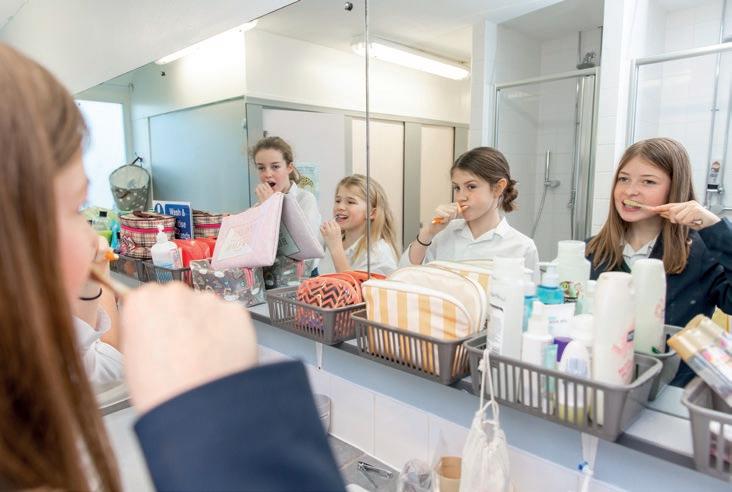
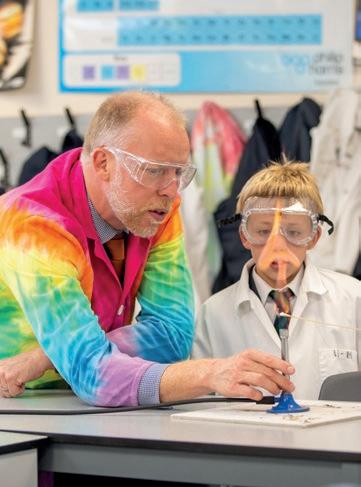
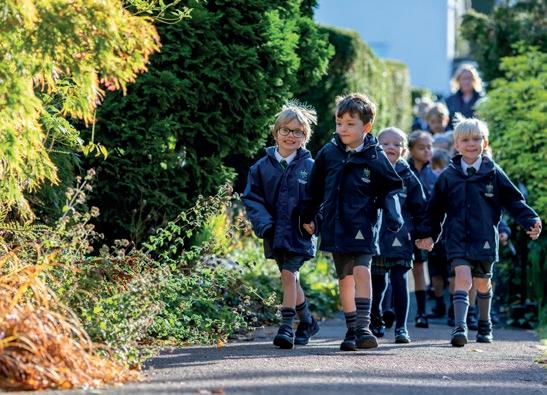

Boarding: The boarding community has continued to thrive over the academic year with increasing numbers of pupils converting from day pupils to flexi boarders. By the end of the summer term no fewer than 80 pupils had boarded at some point in the year. There has also been growing interest in boarding with 16 additional full boarders joining the school in Autumn 2023.
The parent and pupil surveys in the recent ISI Inspection gave the boarding provision a resounding endorsement which is great for morale as well as providing useful feedback to inform future systems and processes.
The Governors have considered the Charities Act 2011 on public benefit and have had due regard for Charity Commission Guidance on the Subject.
The School was committed to funding the education of members of the local community who would not normally be in a position to afford the school fees but who demonstrate that they would benefit from the educational environment the School offers. More details are given on page 18.
The School also raised funds for local, national and international charitable organisations. A number of local groups also made use of the School’s facilities at either a reduced cost or free of charge, both in term time and throughout the holiday periods.
It was with great sadness that Abberley Hall closed its doors for the last time at the end of the Summer Term 2023. The announcement of the closure had been made in Lent 2023 and it is a testament to the exceptional Abberley Hall community of pupils, parents and staff that the school continued to offer its award-winning educational experience through to the very last day.
The school saw demonstrable improvements over the course of the year and despite the announcement of the closure the school continued to be a vibrant place for children to learn. Saturday school take up continued to be strong, although optional, most children chose to come in and take part in the enrichment programme. Pastoral care was a key strength of the School with a great deal of time and energy focused on this area and the more flexible approach to boarding continued to see strong popularity. The year was also successful academically.
Following the announcement of closure staff were supported to find new jobs and pupils were supported to find new schools. The end of year was a celebration of all the positive elements of the school for both current and past pupils, parents and staff.
The Governors have considered the Charities Act 2011 on public benefit and have had due regard for Charity Commission Guidance on the Subject.
Prior to its closure, the School was committed to funding the education of members of the local community who would not normally be in a position to afford the school fees but who demonstrated that they would benefit from the educational environment the School offered. The School had limited reserves and the bursary scheme was funded through revenues generated by the School and not through investment income. During the 2022-23 year, Bursaries were awarded to 20 pupils (2021-22: 30 pupils). The value of this funding was £183,631 (2021-22: £209,061).
A number of local groups also made use of the School’s facilities at either a reduced cost or free of charge. The School actively promoted the development of stronger links with local maintained Schools. Activities included the hiring of the swimming pool to two local primary schools as well as to local swimming clubs and swimming teaching groups.

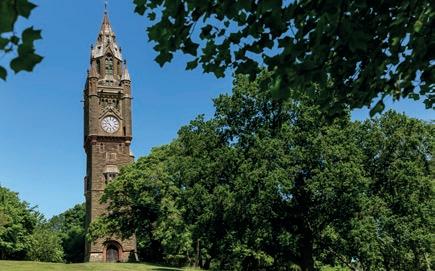
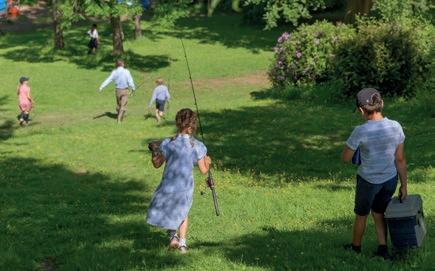
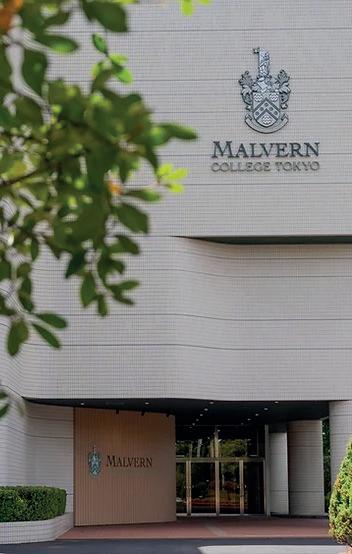
Highlights this year have included preparations for the opening of the College’s 6th international school campus, to open in September 2023 in Tokyo, as well as the re-opening of international travel, enabling the Malvern College International team to visit the College’s schools in Asia in person for the first time since 2019.
The formal launch of Malvern College Tokyo took place in February 2023 at the British Embassy in Tokyo and was attended by the Chair of the College Council as well as HM Ambassador to Japan, Julia Longbottom. Malvern College Tokyo, based in the western suburbs of Tokyo, will be an IB continuum day school catering for both a local and expatriate market, under the leadership of Mr Mike Spencer, Founding Head of the school.
We were pleased to welcome proprietors, Heads and other senior representatives to the Malvern College Family of Schools Annual Leadership Conference, held over two days in the run up to the summer half term, including Gavin Boyle, the newly appointed Headmaster of Malvern College Egypt.
Whilst enrolment growth has remained slow this year, primarily due to the continuing impact of Covid in China and Hong Kong, we anticipate an improved growth trajectory next year now that China’s international borders have re-opened, and with the addition of Malvern College Tokyo to the portfolio.
We have been particularly pleased to see schools respond well to the long-term challenges of Covid in some excellent examination results, including an average IB Diploma score of over 39 for the first exam cohort from Malvern College Hong Kong.
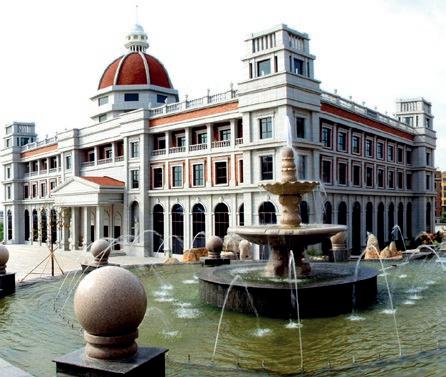
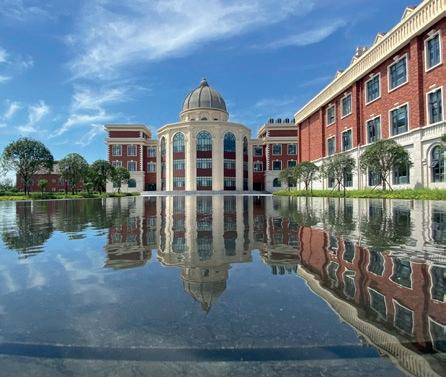
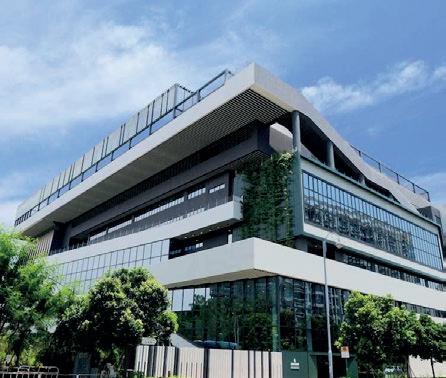
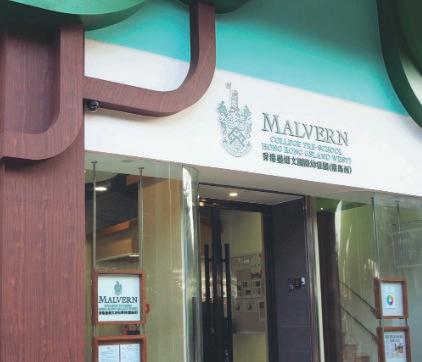
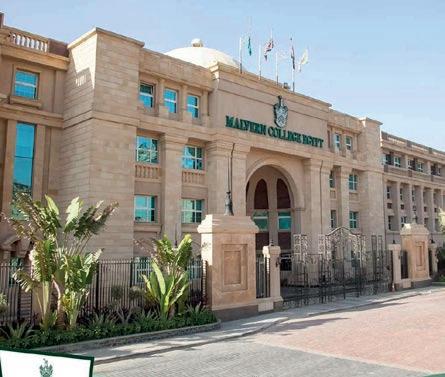
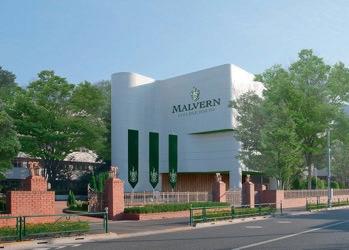
This year has seen the business continue its postCovid recovery, with record numbers of clients and visitors utilising the College’s facilities during the Easter and summer holidays. We were particularly pleased with the success of the relaunch of Malvern College Summer School, the College’s proprietary summer language course, with well over 100 children attending a range of courses, together with the continuing growth of the Malvern College Cricket Festival in its second year. The National Schools Symphony Orchestra (NSSO), the third of the proprietary courses operated directly by the College’s commercial team, moved to the Easter holidays this year and has now fully regained ground lost during Covid under the inspiring leadership of Nicole Wilson, the Artistic Director.
We are delighted also to have been able to continue to host a significant number of high-profile rugby and hockey events, including the RFU Academy Festival, England’s biggest gathering of pathway players with approximately 1,200 young players in attendance during the event. Our main strategic focus remains on the development of our proprietary courses, in particular Malvern College Summer School, and with a full team now in place we expect this area of the business to grow significantly over the next few years.

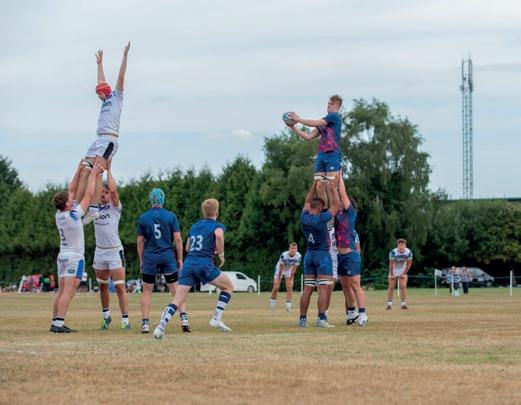
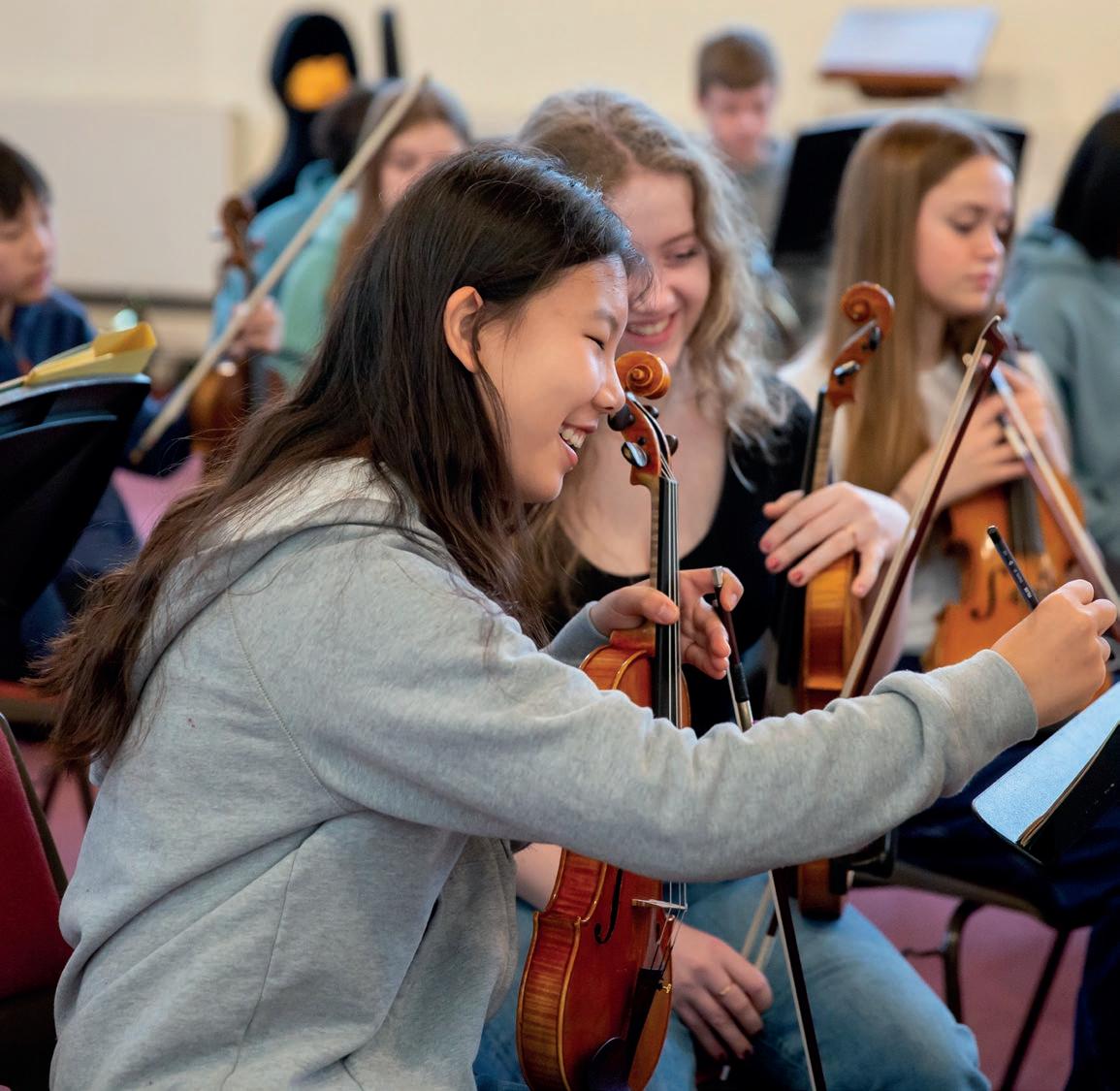

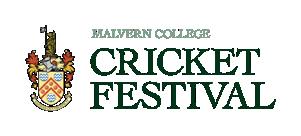



































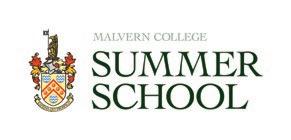
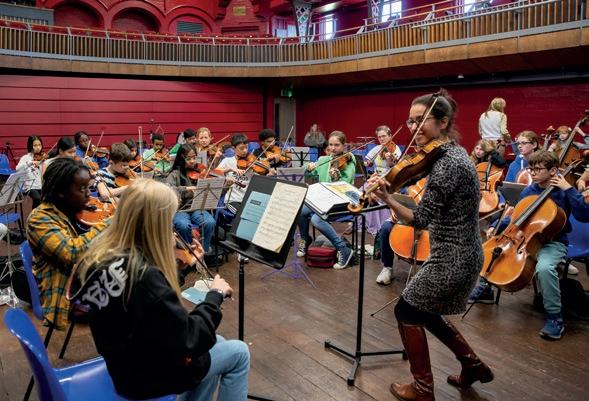


The Malvernian Society, Malvern College’s philanthropy arm, is fortunate to receive ongoing financial support from a range of donors, including Old Malvernians/ Alumni, current and former parents, and other Friends of Malvern College. These philanthropic gifts enable the Society to fulfil its charitable objects and to support Malvern College with its strategic plans. In financial year 2022-23, £249,339 was granted to the College by the Malvernian Society. The College and Malvernian Society are working together ever more closely.
We continue to be in touch with ‘cornerstone’ prospective donors, who we believe have the capacity to support the Malvernian Society in a substantial way. Planned legacy giving also remains a crucial part of our work, resulting in an all-time high of legacies under management.
2022-23 saw the Society launch its first ever ‘Green Giving Day’ to kickstart the College’s journey to become a carbon net zero campus by 2050 if not before – something that is increasingly important to us as a school and within the local community in an area of outstanding natural beauty.
This Green Giving Day launched a new Green Fund in support of the College’s Net Zero ambitions. The 36-hour online fundraiser bought together alumni, pupils, parents, staff, and friends of the College, to raise an incredible £134,766. 197 OMs, 11 EOGs and 103 parents were among those who donated, and we received donations from five continents –
Europe, America, Africa, Asia, and Australia. We were particularly delighted that 78% of donations were from first time donors and 6% were from OMs under 30 years old.
Running alongside the virtual event were pupil and staff activities to ensure everyone felt involved and there was a fantastic atmosphere on campus. Activities including a ‘Wheelie Green Challenge’ (a kilocalorie pupil and staff cycling challenge), green clothes day, sustainability themed window dressing competition, green smoothie bike, green bake sale, and a finale screening of the award-winning documentary, ‘Fashion Reimagined’ in The Rogers Theatre.
We now look forward to building momentum with our next Green Giving Day which will take place on 5th6th November 2024.
Our fundraising priorities for the year ahead are as follows:
Our goal is to raise an endowment fund capable of funding 10 pupils on 110% support in perpetuity and therefore to raise at least £15 million for 10 new, fully funded Assisted Places over the next 10 years. This is just our immediate ambition; our Headmaster and senior management team’s vision goes much beyond that.
Long-term, we want Malvern College to be a place where any able and talented pupil can come, regardless of their financial background.
“ “ Long-term, we want Malvern College to be a place where any able and talented pupil can come, regardless of their financial background.
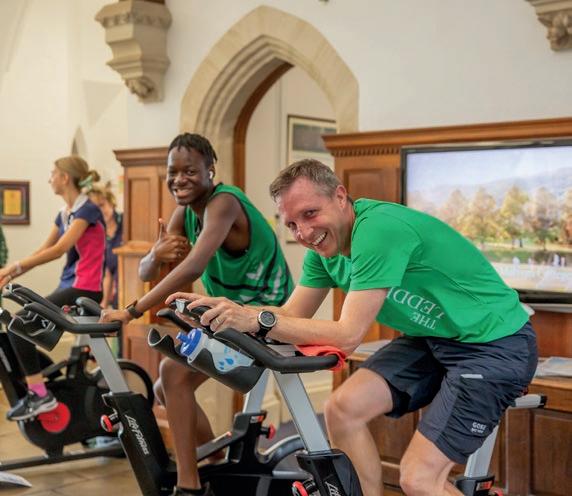
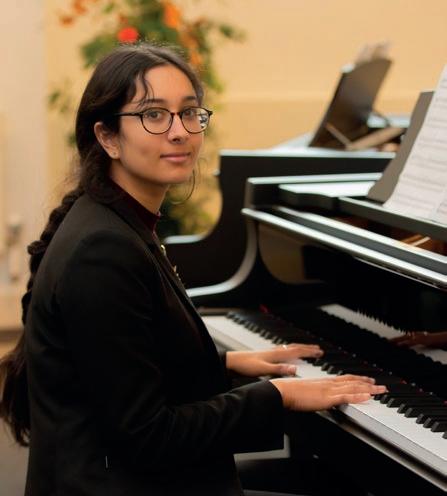
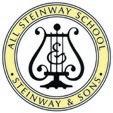
A recent new fundraising focus has been the creation of a new ‘Green Fund’, to assist the College with various new sustainability initiatives going forwards. We believe that the fund will attract a considerable amount of support, also given that a substantial number of our Alumni and other stakeholders work in the field of sustainability.
We continue to fundraise for the College’s Music School project, to be implemented in two phases and which will aim to create:
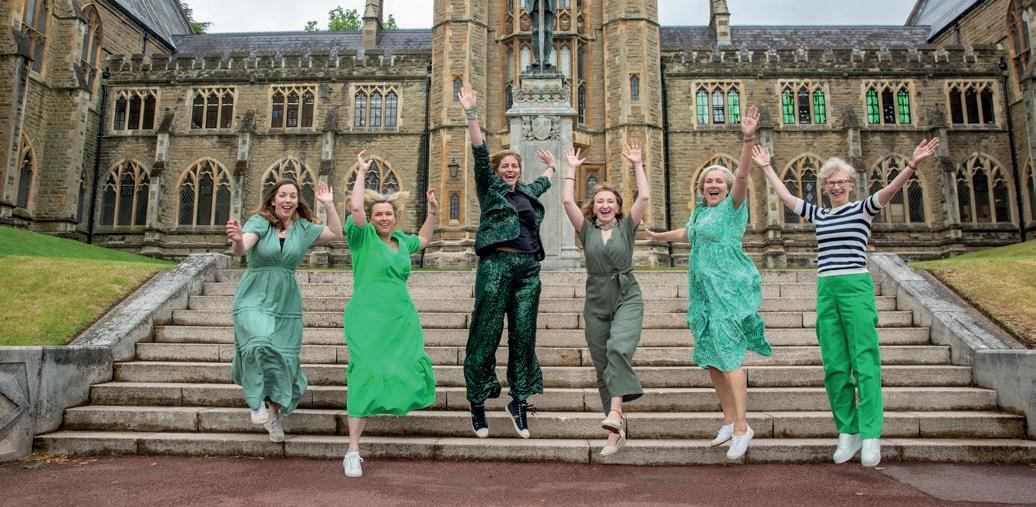
» Sound attenuation between practice rooms and other areas of the building
» Easily controllable heating
» A permanent home for our new Steinway pianos
» ‘Zoned’ learning and practice areas for greatly optimised use by our pupils, teachers and visitors
The Music School Project is the second phase of our overall ‘Music @ Malvern’ initiative – the first one being the acquisition of our ‘All-Steinway School’ status.
Both the Society and Malvern College are extremely grateful to all Old Malvernians, parents and Friends of the College who support the Society financially, whether through immediate philanthropic gifts or through their legacy planning.
All fundraising activities for the College are carried out by highly professional College staff with assistance from the Malvernian Society, alongside the parents and pupils with the running of specific fundraising events. The College does not use external professional fundraisers or have any commercial participators (with the exception of agency support for the Green Giving Day initiative).
The College and Society adhere to GDPR regulations and only contact those for who our communications will be relevant and of interest. There were no incidences of failure to comply with fundraising standards and no complaints recorded. All fundraising
activities report into the Chief Operating Officer, are monitored by the Headmaster, and are overseen by the members of the College Council. No complaints relating to fundraising activities have been received by the College during the financial period. The College has in place procedures that would be followed in the event of a complaint being received with the initial response being the responsibility of the Chief Operating Officer. Any continuing issues would then be passed to the College Council to determine what further action might be required. The College does not currently subscribe to any specific fundraising standards or schemes for fundraising activities. The Malvernian Society does subscribe to the Fundraising Regulator. In particular,
“ “ Both the Malvernian Society and Malvern College are extremely grateful to all Old Malvernians, parents and Friends of the College who support the Society financially, whether through immediate philanthropic gifts or through their legacy planning.
the College considers that its processes and controls ensure that vulnerable people and other members of the public are protected from any unreasonable intrusion of their privacy and that no fundraising activities would be unreasonably persistent or place undue pressure on a person to give money or property.

As the Engagement arm of the College, the Malvernian Society continues to deliver on our promise that a relationship with Malvern College is for life, coming out of Covid-19 restrictions allowed for the opportunity for face-to-face interactions to return to ‘normal’. A vibrant events programme returned with some new initiatives, and as the various OM clubs continue to thrive, new clubs have been introduced.
We are proud of our truly international community, with Old Malvernians and Ellerslie Old Girls now living in 92 countries, across six continents. The Society is continually working to create opportunities for our global alumni, so they continue to feel connected to the College wherever they are located, and the Society has been encouraging in-country gatherings, with the first ‘global Commemoration’ reunions taking place, timed to coincide with Commemoration at Malvern College.
We keep connected with our alumni through digital communications – social media channels, website, and email – as well as events and reunions, and our professional networking website, OM Connect.
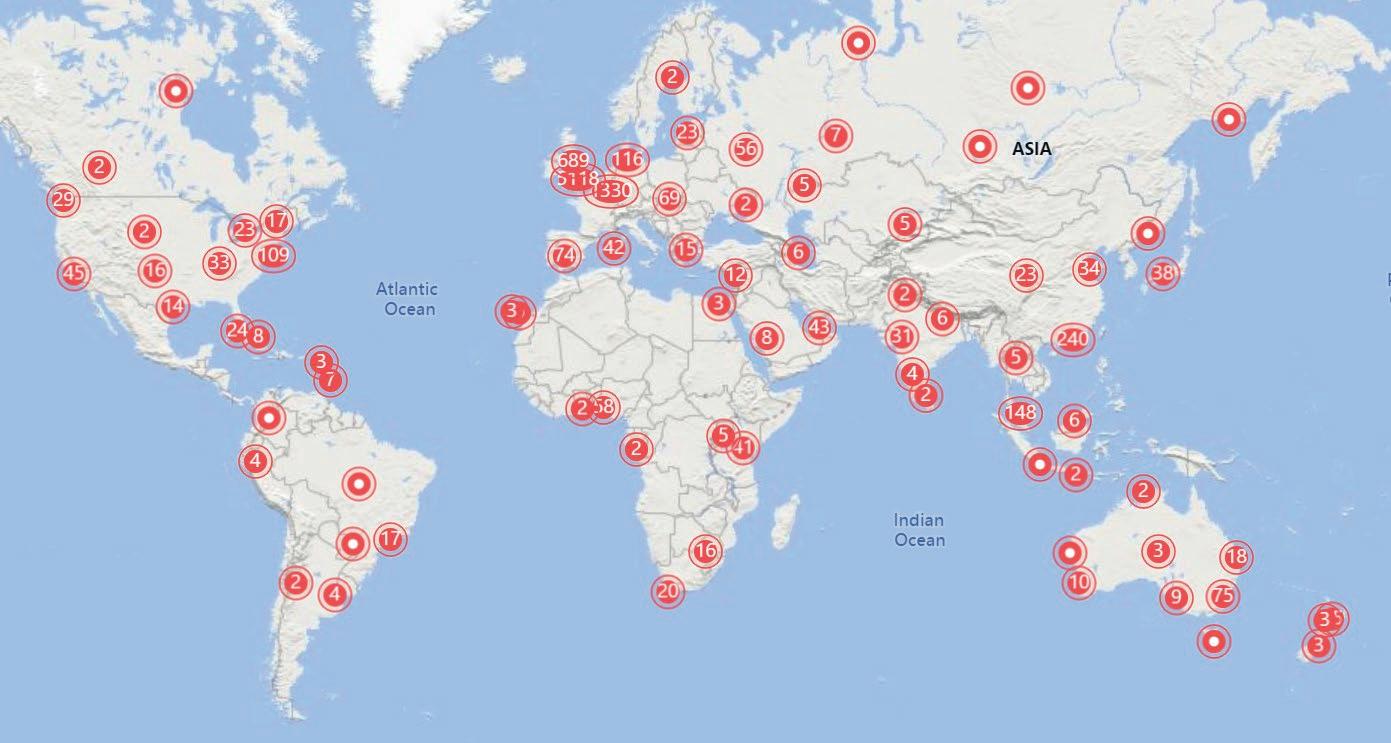
This year has seen a fantastic selection of events delivered by the Malvernian Society. A highlight being the Ellerslie Old Girls Centenary Reunion held in May. 178 old girls, former and current members of staff joined together for a wonderful day of celebrating this girls’ school, which formally joined Malvern College in 1992. Everyone who attended the reunion had special memories to share, with EOGs travelling far and wide to attend – America, Australia, and the Bahamas to name just a few of the countries these ladies now reside in.
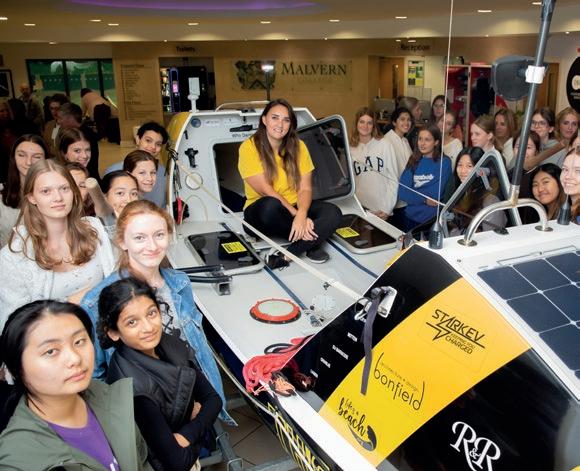
We held our second Commemoration Weekend, with the introduction of a 10 Year Reunion to start the schedule of events for the weekend. This was a huge success, attended by over 60 of our 2013 Leavers and has therefore been added to the event schedule as an annual event going forwards. There were also several ‘in-country’ events around the globe (including Barbados and Malaysia), organised by OMs themselves, which took place in recognition of Commemoration, giving guests the opportunity to reconnect with the College from afar.
In addition to our social events, OMs continue to give their time to Malvern College, with a number present at the annual Careers Evening and both Lara Vafiadis (8.03-06) and Rose Harvey (6.08.10) returning to give inspirational talks to pupils about their personal achievements since leaving Malvern (Lara’s solo row of the Atlantic and Rose’s professional running career). Talal Hasan (2.95-00), winner of an Earthshot Prize, also addressed pupils in Chapel at the start of Green Giving Day.
We remain grateful for the help and support OMs and EOGs give to the Society and College. What is clear through our engagement efforts, is the affiliation alumni feel with the College; their warmth and affection is all-encompassing and something the Society seeks to capitalise on through its fundraising efforts.
The OM Clubs and Societies continue to thrive, with keen and enthusiastic members at the helm to ensure support continues. We now have 14 OM Clubs: Arts Society, Court Games, Cricket Club (OMCC), Football Club (OMFC), Fly Fishing Club, Golfing Society (OMGS), Green Club, Hare & Hounds Club, Hockey Club, OM Lodge, Netball Club, Rifle Club, Rugby Union Football Club and Sailing Club.
The OMFC, OMGS and OMCC continue to be the most well subscribed clubs. The OMFC have had an excellent season, securing their promotion to Division 1 of the Arthurian League. With the OMGS having an extensive membership list, they continue to put on a busy calendar of fixtures across the UK. The OMCC Patrons enjoyed a most convivial lunch for the opening game of the Cricketer Cup, only to see the Malvernians make it all the way to the final and win against their arch-rivals, the Old Tonbridgians.
The OM Court Games, although fewer in numbers, has seen a successful season, with one of our OM players winning the Canadian Amateur Singles Championship. The OM Real Tennis Day at Morton Morrell continues with an excellent level of play from more senior OMs.
At the Border Shield match in October, a meeting was held to re-constitute the OMRUFC. They have since played their first tournament in May at the Oxford 7s, winning two out of the three games in their group. The OM Hockey team competed in the Sixes Trophy at Dean Close School and won for the second year running.
As well as our traditional clubs, we are striving to create new opportunities for our alumni. A meeting was held at the College in September to engage members and form an OM Armed Forces Society; there was a keen turn out and a draft constitution was written. We also have a newly established Fly-Fishing Club which is proving to be an excellent addition. In support of Malvern College’s sustainability ambitions, a new Green Club has been established. In June, the Green Club was officially launched at the Good Company Tap Café in London. Timed to coincide with, and support, our first Green Giving Day, membership and awareness of this new initiative continues to grow.
A calendar highlight has been the inaugural OM Club Dinner, held at the Caledonian Club in London in February. The evening was attended by over 100 OMs, with several OM Clubs represented. Our Guest Speaker for the occasion was Mark Pougatch, leading sports broadcaster and OM (2.81-86) who gave a highly entertaining after dinner speech. The event was so popular, a date was immediately set for 2024.
1. Continue to develop face to face events so more OMs and EOGs wherever they are in the world are encouraged to meet in person, whether formally or informally
2. Complete the work to improve our digital presence including new website and review offline presence and OM Connect
3. Build on the momentum created by the Green Giving Day (e.g. develop the Green Club and second Green Giving Day scheduled for November 2024)
4.Complete the updating of OM merchandise offer
5. Complete digitalisation of the Archive which will allow us to celebrate the heritage of Malver n College more widely across the community
» 1,200 OMs and EOGs attended events
» 28 alumni events held
» 178 at the Ellerslie School Centenary –largest reunion event to date
» 1 Commemoration Weekend including AGM and Club sports matches
» 1 Ledbury Run
» 1 new 10 Year Reunion (now an annual event)
» 7 Development events
» 8 Events offsite
» 14 Clubs or Societies as part of OM Club
» 3 news Clubs launched
» 2,179 Instagram followers
» 2,246 Facebook followers
» 3,062 Registered users on OM Connect, with 64% willing to offer their help
» 162 page OM Newsletter distributed
» 6,200 monthly emailed OM E-Newsletter

The College delivered an excellent £0.9m EBITDA for the year, including £0.25m of concession and donation support from The Malvernian Society
Following so much upheaval in the sector during the two COVID years (2019-20 and 2020-21) and a volatile economic climate following the beginning of the Russia Ukraine conflict together with the rapid increase in inflation culminating in a 12 month CPI rate of 6.8% in July, it has been most encouraging to see the College post a resilient financial performance in 2022-23.
The Malvern College Group overall deficit increased from £0.1m to £1.2m (not including the introduction of TDM assets accounted for as a donation) largely due to the ongoing losses at Abberley Hall.
The College itself delivered an excellent £0.9m EBITDA for the year, including £0.25m of concession and donation support from The Malvernian Society. Malvern College Enterprises and College Guardians collectively delivered a solid £0.6m net contribution with strong demand across their services. The Malvern College International Schools business delivered an outstanding £1.6m of net contribution to the Corporation as we see continued enrolment growth.
It was a sad year for Abberley Hall. The impact of the economic environment significantly increased the underlying cost base, the prep school market was challenging and the financial impacts of both of these have occurred in the context of the very real threat of VAT being applied to Independent School
fees. The College made the decision to cease further loan funding beyond the 2022-23 academic year, and despite herculean fundraising efforts by the school community, together with approaches by the Governors to school groups and investors, it became clear that the School was no longer a going concern and the College formally called in its loans.
The financial position of The Downs is also challenging, however the merger between the Downs and the College during the year has already resulted in some economies of scale and there have been early signs of growth under the exceptional leadership of the Headmaster, Andy Nuttall. We are investing in growth within the Downs and have a strong future plan. Close to 80% of The Downs Year 8 pupils are expected to join The College in September 2024, continuing its vital part of the Malvern journey for families.
Ongoing inflation is a challenge for the sector. 53% of the Group’s operating expenditure is in payroll, and robust mechanisms are in place to control recruitment whilst remaining competitive based on external benchmarks. 60% of the remaining nonpayroll operating expenditure is in the following five areas, almost all of which are exposed to some of the highest rates of inflation:
1. Food and hospitality: a full external audit has been completed with the Independent School Catering Consultancy (ISCC) to establish further efficiencies.
2. Gas and Electricity: we continue to engage with our energy broker to secure the best rates and we are focusing on our sustainability plans to reduce long-term energy consumption.
3. Marketing and Admissions: we will not be cutting costs, but are placing greater focus on return on investment to maximise our investment.
4. Estates Maintenance: we are developing a long-term ‘Planned Preventative Maintenance’ programme to avoid unnecessary reactive maintenance costs in the future.
5. Academic: whilst we do not plan to restrict funding in this area, we have put in place robust cost controls and improved communication with budget holders.
The Group’s net debt position improved by £1.8m to a healthy £1.8m. The College repaid in full the CBIL loan taken during COVID, and secured further financing to deliver a range of strategic projects that aim to increase pupil numbers and experience and deliver utilities savings through sustainability investments.
We closed the 2022-23 year with a robust balance sheet. The detailed consolidated Group and College balance sheet follow in the coming pages.
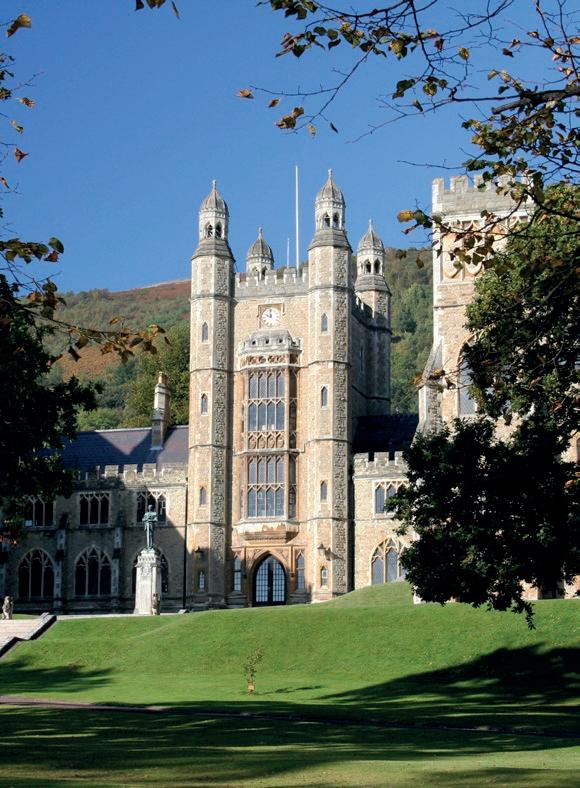
The diagram below shows the results and combined balance sheets of the ongoing consolidated group which includes the Downs Malvern but excludes Abberley Hall, plus the Malvernian Society, which together from the ‘Malvern College UK Family’:
The Council members are responsible for preparing the Report of the Council and the financial statements in accordance with applicable law and United Kingdom Generally Accepted Accounting Practice (United Kingdom Accounting Standards).
The law applicable to charities in England & Wales requires the Council members to prepare financial statements for each financial year which give a true and fair view of the state of affairs of the Charity and the Group and of the incoming resources and application of resources, including the income and expenditure, of the Charitable Group for that period. In preparing these financial statements, the Council members are required to:
» select suitable accounting policies and then apply them consistently;
» observe the methods and principles in the Charities SORP;
» make judgements and estimates that are reasonable and prudent;
» state whether applicable UK accounting standards have been followed, subject to any material departures disclosed and explained in the financial statements; and
» prepare the financial statements on the going concern basis unless it is inappropriate to presume that the charity will continue in business.
The Council members are responsible for keeping adequate accounting records that are sufficient to show and explain the Charity’s transactions, disclose with reasonable accuracy at any time the financial position of the Charity and Group and enable them to ensure that the financial statements comply with the Charities Act 2011, the Charities (Accounts and Reports) Regulations 2008 and the provisions of the Charity’s constitution, are also responsible for safeguarding the assets of the Charity and the Group and hence for taking reasonable steps for the prevention and detection of fraud and other irregularities.
Crowe U.K. LLP have indicated their willingness to continue in office and a resolution concerning their reappointment will be proposed at the Annual General Meeting.
On behalf of the Council on 28 May 2024

Carey Leonard Treasurer
Note, the table above is the current situation and differs from the Treasurer report table which shows a future Malvern College Family of Schools outlook without Abberley Hall but including the Malvernian Society.
* The 2022-23 balance does not agree to the Statement of Financial Activities as the introduction of The Downs Malvern assets is omitted from the above table The 2019-20 balance also did not agree to the Statement of Financial Activities as the introduction of the Abberley Hall assets was omitted from the above table.
The College was, and is, well placed to handle the current financial challenges of a challenging environment. Excluding the donation arising from the introduction of TDM’s assets, the Group recorded a Net Deficit of £1.2m (2022: Net Deficit £0.1m) as a result of the ongoing challenges at Abberley Hall resulting in its closure in June as reported earlier.
Operationally, the College continued with its good financial management to reduce costs, increase income with a focus on pupil starter numbers and to adopt a prudent approach to capital expenditure.
The professional approach of the College to fundraising and the generosity of the College family resulted in donations from the Malvernian Society of £0.2m, a smaller amount than prior years as we have been preparing for two major projects in 2024, (the Grub and the MemLib Sixth Form Centre) which the Society have agreed to majority fund (£0.75m). The College continues to focus on fundraising to support its capital programme and increasingly to provide means tested bursaries - all funds are received by and held in the Malvernian Society Limited until released to the College (as set out in Note 20) and are not consolidated into the financial statements of the College. Over the last 10 years, funds of circa £14m have been raised through direct gifts and legacies from our alumni body for which we are most grateful.
The revenue and expenditure results are set out in the Group Statement of Financial Activities on page 78. The results of Abberley Hall Limited are consolidated and the results of The Downs Malvern for the 9 month period from 1 November 2022 to 31 July 2023 are also consolidated. The Group results are summarised on the left table.
Earnings before depreciation and interest were £1.7m (2022: £2.3m). The contribution from the Trading operations were broadly flat at £2.2m (2022: £2.2m). College and TDM operations generated an overall surplus of £0.9m (2022: Surplus £1.0m), this includes donations from the Malvernian Society. The results include the annual trading performance of Abberley Hall which incurred a loss of £1.3m (2022: Loss £0.8m).
As a result of the broader economic uncertainties resulting from inflation and other political issues, which are likely to continue in the following years, the College continued to review its cost bases. Whilst the College remains committed to the ongoing development and enhancement of its facilities it is prudently conducting a detailed review of future capital programmes. Expenditure is being focused on the core repair and maintenance of the College alongside the on-going refurbishment of the boarding houses, as well as exciting new initiatives to create a 6th Form Centre in the Memorial Library from September 2024 and a new community Café in the Grub from the Summer Term 2024.
On the balance sheet, total net assets for the Group, with all land and buildings stated at cost less depreciation, amount to £26.1m (2022: £22.1m). Net current assets at 31 July 2023 were £12.6m (2022: £3.2m). As a result of FRS 102, the valuation of the SWAP is reported on the balance sheet as at year end.
The movement in the valuation, which is provided by Lloyds Banking Group PLC, is shown in the Statement of Financial Activities. The loans to Abberley Hall have been classified as due within one year in the balance sheet, given the school has closed, and in line with the terms of the agreements the loans have been called in. The Abberley Hall estate is being actively marketed for sale.
In May 2007, the College arranged a loan facility of £13.5m with Lloyds Banking Group PLC. The final repayment date of the loan is 20 years after the Commitment Termination date, which was August 2011.
A loan of £3.0m was drawn down in December 2012. This loan is being repaid over 14 years and repayment commenced in December 2013.
In July 2020, as a precaution against potential adverse economic conditions over the next few years, the College arranged a loan facility (CBIL) of £5.0m with Lloyds Banking Group PLC. This loan was fully repaid during the year.
In December 2021, the College arranged a loan facility of £1.0m with Lloyds Banking Group PLC. This loan is being repaid over 10 years and repayment commenced in December 2022.
In March 2023, the College arranged a loan drawdown of £7.5m. This loan is being repaid over 15 years and repayment commenced in May 2023.
The total combined amount of the drawdown on all facilities at the year-end was £14.2m. With cash and short-term deposits of £12.4m, the net debt at 31 July 2023 was £1.8m (2022: £3.6m). The College is fully compliant with all its banking covenants. The College places excess funds on deposit within Lloyds Banking Group plc.
The College has a majority shareholding (80,899 of 80,900 shares) in its trading subsidiary, which carries out non-charitable trading activities for the College. Malvern College Enterprises Limited (MCEL) made a profit of £209K for the year and will make a gift aid payment to the College of £180K (2022: £Nil). The trading operations of MCEL include membership and hiring of the Sports Complex, the letting of College and The Downs facilities for holiday sports camps, conferences and weddings and commission from uniform and book sales. It previously also provided an in-house guardianship service, but this activity was transferred to a separate entity, College Guardians Limited, on 3 September 2021.
The College has a 100% shareholding in its trading subsidiary, which carries out non-charitable trading activities relating to overseas schools for the College. MCIL will make a gift aid payment of its trading surplus for the current year of £1.6m (2022: £1.8m) to the College, thereby transferring all of its taxable profits to the College. The operations of MCIL continue to grow with the launch of Malvern College Tokyo in September 2023 and several new initiatives being considered for the medium to long term. However, Malvern College decided to withdraw its licence from the operators of Malvern College Switzerland who were unable to reach the scale needed to be financially sustainable.
As above, the guardianship services were incorporated into a new stand-alone entity called College Guardians Limited in September 2021. This company is a wholly owned subsidiary of the College and will make a gift aid payment of its trading surplus for the current year of £0.4m (2022: £0.3m) to the College, thereby transferring all of its taxable profits to the College.
Unrestricted funds are needed:
(a) to provide funds which can be designated to specific rebuilding and refurbishment projects to enable the College to provide boarding accommodation that complies fully with the Boarding School: National Minimum Standards, and teaching accommodation that meets Independent Schools Inspection standards; and
(b) to provide a financial cushion that will enable the College to continue to function as an independent school in the event of a significant fall in pupil numbers (and thus fee income).
Free reserves are unrestricted funds (including designated) after deducting stocks and fixed assets net of borrowing. The free reserves we aim to hold is equivalent to the three months with the highest net outgoings, c£7m. Unrestricted funds are £20.7m (2022: £22.0m) which includes our current cash holding of £12.4m (2022: £8.1m).
The level of reserves is considered sufficient to meet the identified needs.
The unrestricted College fund is £17.5m (2022: £17.5m) and the Group’s free reserves are £10.4m (2022: £1.9m).
In 2020-21, the College Council agreed to designate 25% of the MCIL gift aid payment to a designated fund. This year £0.43m has been transferred. The amount of this fund is £1.98m (2022: £1.55m) and is intended to help fund means-tested bursaries.
The College Council carefully and regularly monitors the College’s financial performance against budget including, inter alia, pupil numbers (gross fee income), operating costs and capital expenditure on the capital projects.
The College’s policy on restricted funds is to record separately donations, grants and other sources of fundraising where restrictions are imposed that are narrower than the College’s overall objectives. Restricted funds are £5.4m (2022: £0.15m). This includes the assets introduced from TDM, which are shown as restricted due to TDM’s objects being more limited than those of the College.
» We have audited the financial statements of Malvern College for the year ended 31 July 2023 which comprise the Group Statement of Financial Activities, the College Statement of Financial Activities, the Group and College Balance Sheets, the Group Statement of Cash Flows and notes to the financial statements, including significant accounting policies. The financial reporting framework that has been applied in their preparation is applicable law and United Kingdom Accounting Standards, including Financial Reporting Standard 102 ‘The Financial Reporting Standard applicable in the UK and Republic of Ireland’ (United Kingdom Generally Accepted Accounting Practice).
In our opinion the financial statements:
» give a true and fair view of the state of the group’s and the parent charity’s affairs as at 31 July 2023 and of the group’s income and expenditure, for the year then ended;
» have been properly prepared in accordance with United Kingdom Generally Accepted Accounting Practice; and
» have been prepared in accordance with the requirements of the Charities Act 2011.
We conducted our audit in accordance with International Standards on Auditing (UK) (ISAs (UK)) and applicable law. Our responsibilities under those standards are further described in the Auditor’s responsibilities for the audit of the financial statements section of our report. We are independent of the group in accordance with the ethical requirements that are relevant to our audit of the financial statements in the UK, including the FRC’s Ethical Standard, and we have fulfilled our other ethical responsibilities in accordance with these requirements. We believe that the audit evidence we have obtained is sufficient and appropriate to provide a basis for our opinion.
In auditing the financial statements, we have concluded that Council’s use of the going concern basis of accounting in the preparation of the financial statements is appropriate.
Based on the work we have performed, we have not identified any material uncertainties relating to events or conditions that, individually or collectively, may cast significant doubt on the charity’s or the group’s ability to continue as a going concern for a period of at least twelve months from when the financial statements are authorized for issue.
Our responsibilities and the responsibilities of the Council with respect to going concern are described in the relevant sections of this report.
Council are responsible for the other information contained within the annual report. The other information comprises the information included in the annual report, other than the financial statements and our auditor’s report thereon. Our opinion on the financial statements does not cover the other information and, except to the extent otherwise explicitly stated in our report, we do not express any form of assurance conclusion thereon.
Our responsibility is to read the other information and, in doing so, consider whether the other information is materially inconsistent with the financial statements or our knowledge obtained in the audit or otherwise appears to be materially misstated. If we identify such material inconsistencies or apparent material misstatements, we are required to determine whether this gives rise to a material misstatement in the financial statements themselves. If, based on the work we have performed, we conclude that there is a material misstatement of this other information, we are required to report that fact.
We have nothing to report in this regard.
We have nothing to report in respect of the following matters in relation to which the Charities (Accounts and Reports) Regulations 2008 requires us to report to you if, in our opinion:
» the information given in the financial statements is inconsistent in any material respect with Report of Council; or
» sufficient and proper accounting records have not been kept by the parent charity; or
» the financial statements are not in agreement with the accounting records and returns; or
» we have not received all the information and explanations we require for our audit.
As explained more fully in the Statement of Council’s Responsibilities statement, Council are responsible for the preparation of the financial statements and for being satisfied that they give a true and fair view, and for such internal control as Council determine is necessary to enable the preparation of financial statements that are free from material misstatement, whether due to fraud or error.
In preparing the financial statements, Council are responsible for assessing the group and the parent charity’s ability to continue as a going concern, disclosing, as applicable, matters related to going concern and using the going concern basis of accounting unless the Council either intend to liquidate the charity or to cease operations, or have no realistic alternative but to do so.
We have been appointed as auditor under section 151 of the Charities Act 2011 and report in accordance with the Acts and relevant regulations made or having effect thereunder.
Our objectives are to obtain reasonable assurance about whether the financial statements as a whole are free from material misstatement, whether due to fraud or error, and to issue an auditor’s report that includes our opinion. Reasonable assurance is a high level of assurance, but is not a guarantee that an audit conducted in accordance with ISAs (UK) will always detect a material misstatement when it exists. Misstatements can arise from fraud or error and are considered material if, individually or in the aggregate, they could reasonably be expected to influence the economic decisions of users taken on the basis of these financial statements.
Details of the extent to which the audit was considered capable of detecting irregularities, including fraud and non-compliance with laws and regulations are set out below.
A further description of our responsibilities for the audit of the financial statements is located on the Financial Reporting Council’s website at: www.frc.org.uk/auditorsresponsibilities. This description forms part of our auditor’s report.
was considered capable of detecting irregularities, including fraud
Irregularities, including fraud, are instances of noncompliance with laws and regulations. We identified and assessed the risks of material misstatement of the financial statements from irregularities, whether due to fraud or error, and discussed these between our audit team members. We then designed and performed audit procedures responsive to those risks, including obtaining audit evidence sufficient and appropriate to provide a basis for our opinion.
We obtained an understanding of the legal and regulatory frameworks within which the charity and group operates, focusing on those laws and regulations that have a direct effect on the determination of material amounts and disclosures in the financial statements.
The laws and regulations we considered in this context were the Charities Act 2011, together with the Charities SORP (FRS 102). We assessed the required compliance with these laws and regulations as part of our audit procedures on the related financial statement items.
In addition, we considered provisions of other laws and regulations that do not have a direct effect on the financial statements but compliance with which might be fundamental to the charity’s and the group’s ability to operate or to avoid a material penalty. We also considered the opportunities and incentives that may exist within the charity and the group for fraud. The laws and regulations we considered in this context for the UK operations were The Education (Independent School Standards) Regulations 2014.
Auditing standards limit the required audit procedures to identify non-compliance with these laws and regulations to enquiry of Council and other management and inspection of regulatory and legal correspondence, if any.
We identified the greatest risk of material impact on the financial statements from irregularities, including fraud, to be within fee discounts, and the override of controls by management.
Our audit procedures to respond to these risks included enquiries of management, and the Audit and Risk Committee about their own identification and assessment of the risks of irregularities, sample testing on the posting of journals, reviewing accounting estimates for biases, designing audit procedures over fee discounts, reviewing regulatory correspondence with the Charity Commission, Independent Schools Inspectorate and reading minutes of meetings of those charged with governance.
Owing to the inherent limitations of an audit, there is an unavoidable risk that we may not have detected some material misstatements in the financial statements, even though we have properly planned and performed our audit in accordance with auditing standards. For example, the further removed non-compliance with laws and regulations (irregularities) is from the events and transactions reflected in the financial statements, the less likely the inherently limited procedures required by auditing standards would identify it. In addition, as with any audit, there remained a higher risk of non-detection of irregularities, as these may involve collusion, forgery, intentional omissions, misrepresentations, or the override of internal controls. We are not responsible for preventing non-compliance and cannot be expected to detect non-compliance with all laws and regulations.
This report is made solely to the charity’s trustees, as a body, in accordance with Part 4 of the Charities (Accounts and Reports) Regulations 2008. Our audit work has been undertaken so that we might state to the charity’s trustees those matters we are required to state to them in an auditor’s report and for no other purpose. To the fullest extent permitted by law, we do not accept or assume responsibility to anyone other than the charity and the charity’s trustees as a body, for our audit work, for this report, or for the opinions we have formed.

Crowe U.K. LLP
Statutory Auditor
4th Floor, St James House
St James Square Cheltenham
GL50 3PR
Date: 30 May 2024
Crowe U.K. LLP is eligible for appointment as auditor of the charity by virtue of its eligibility for appointment as auditor of a company under section 1212 of the Companies Act 2006.
The notes on pages 82 to 111 form part of the financial statements.
RECONCILIATION OF FUNDS
The notes on pages 82 to 111 form part of the financial statements.
The financial statements on pages 78 to 111 were approved and authorised for issue by the Council on 28 May 2024 and were signed on its behalf by:

Robin Black Chair, Malvern College Council
The notes on pages 82 to 111 form part of the financial statements.
The notes on pages 82 to 111 form part of the financial statements.
Malvern College was incorporated in the United Kingdom under Royal Charter in 1929 and has no share capital. The College is registered as a charity with the Charity Commission England and Wales (registered no: 527578). Its registered and principal office is College Road, Malvern, Worcestershire, WR14 3DF. This is also the registered address of it’s trading subsidiaries. Abberley Hall Limited is a private company limited by guarantee, incorporated in England and Wales (company no: 00602279). Abberley Hall Limited is registered as a charity with the Charity Commission England and Wales (charity no: 527598). Its registered and principal office is Abberley Hall, Abberley, Worcester, Worcestershire, WR6 6DD.
The consolidated financial statements have been prepared in accordance with Accounting and Reporting by Charities: Statement of Recommended Practice applicable to charities preparing their accounts in accordance with the Financial Reporting Standard applicable in the UK and Republic of Ireland (FRS 102) (effective 1 January 2015) - (Charities SORP (FRS 102)) and the Financial Reporting Standard applicable in the UK and Republic of Ireland (FRS 102) and the Charities Act 2011.
The College meets the definition of a public benefit entity under FRS 102.
The accounts (financial statements) have been prepared to give a ‘true and fair’ view and have departed from the Charities (Accounts and Reports) Regulations 2008 only to the extent required to provide a ‘true and fair view’. This departure has involved following Accounting and Reporting by Charities preparing their accounts in accordance with the Financial Reporting Standard applicable in the UK and Republic of Ireland (FRS 102) issued on 16 July 2014 rather than the Accounting and Reporting by Charities: Statement of Recommended Practice effective from 1 April 2005 which has since been withdrawn.
The College Council have considered the College’s ten year financial forecasts to consider its ability to meet its liabilities as they fall due. They have considered the expectations of pupil numbers, forecast operating costs and current assets and do not believe there are material uncertainties over its ability to continue as a going concern. Accordingly the financial statements have been prepared on a going concern basis.
In light of the current climate the Trustees have undertaken planning and forecasting and continue to closely monitor the developing situation. Despite the current circumstances the Trustees believe that the College’s financial resources and contingency planning is sufficient to ensure the ability of the College to continue as a going concern for the foreseeable future, being at least twelve months from the date of
approval of these financial statements and therefore have prepared the financial statements on a going concern basis.
The financial statements are prepared in accordance with the historical cost convention, with the exception of the derivative financial instrument held at fair value.
The Group Statement of Financial Activities, the Group Balance Sheet and the Consolidated Statement of Cash Flows include the financial statements of the College and its subsidiary undertakings made up to 31 July 2023, on a line-by-line basis. Intra group transactions and profits are eliminated fully on consolidation.
On 1 November 2022, The Downs Malvern College Prep School (TDMCP) was merged into the College and are consolidated from that date. Due to this, the prior year figures are not directly comparable.
Donations are credited to revenue when the College has entitlement to the funds, any performance conditions attached to the item(s) of income have been met, it is probable that the income will be received and the amount can be measured reliably.
Fees receivable and charges for services and use of premises are accounted for in the period in which the service is provided and it is probable that the income will be received. Fees receivable are stated after deducting allowances, scholarships, grants, bursaries and exhibitions allowed by the College and Abberley Hall Limited (the School).
MCEL, MCIL and CG’s trading income is accounted for in the period in which the income is earned. The College and Abberley Hall’s ancillary and non-ancillary trading income is accounted for in the period in which the income is earned.
Non-fee but educational income is accounted for in the period in which the income is earned.
Bank interest earned on funds on deposit is accounted for in the period in which the investment income is earned.
The College and the School offers parents the opportunity to pay for tuition fees in advance in accordance with a written contract. The amount received is invested and interest is accrued to contracts. This is treated as deferred income until the pupil joins the College or School whereupon the fees for each term is charged against the remaining balance and taken to income.
Final term deposits are deposits placed when pupils join the College or the School, which are offset against fees and disbursements due for the last term each pupil attends. All deposits are held as deferred revenue.
Grants receivable are credited to the Statement of Financial Activities in the period in which they are receivable.
All expenditure is accounted for on an accruals basis and has been classified under headings that aggregate all costs related to the category. There are no costs which cannot be directly attributed to particular headings.
Termination payments are accounted for as soon as the College or School is aware of the obligation to make the payment.
Grants from restricted funds are included as expenditure in the period for which the award is given. Bursaries and allowances from unrestricted funds towards college or school fees at the College and School are treated as a reduction in those fees.
Support costs comprise the direct costs, including staff, attributable to college or school activities, an appropriate apportionment of indirect costs and the school’s governance costs.
The College governance costs comprise the cost of external audit, the costs of Management Board and Council meetings and strategic salary costs. The strategic salary costs include the costs of preparing the statutory financial statements and the costs of senior staff involvement in the strategic management of the College.
Any irrecoverable VAT is charged to the Statement of Financial Activities, or capitalised as part of the cost of the related asset, where appropriate.
Transactions in foreign currencies are recorded at the rate ruling at the date of the transaction. Monetary assets and liabilities are retranslated at the rate of exchange ruling at the Balance Sheet date. The functional and presentational currency of the College and School is considered to be GBP because that is the currency of the primary economic environment in which the College and School operates.
Liabilities are recognised when an obligation arises to transfer economic benefits as a result of past transactions or events.
General funds are unrestricted funds which are available for use at the discretion of the Council in furtherance of the general objectives of the College and which have not been designated for other purposes.
Designated funds comprise unrestricted funds that have been set aside by the Council for particular purposes. The aim and use of each designated fund is set out in the notes to the financial statements.
Restricted funds are funds which are to be used in accordance with specific restrictions imposed by donors or which have been raised by the College or School for particular purposes. The aim and use of each restricted fund is set out in the notes to the financial statements.
The College and School contributes to the Teachers’ Superannuation Scheme at rates set by the Scheme Actuary and advised to the Council by the Scheme Administrator. The College and School contributes to one defined contribution scheme for non-teaching staff. Amounts paid in relation to these Schemes are charged to the Statement of Financial Activities when they fall due. All pension costs are allocated to unrestricted funds.
Assets obtained under finance leases are capitalised as tangible fixed assets. Assets acquired by finance lease are depreciated over the shorter of the lease term and their useful lives. Finance leases are those where substantially all of the benefits and risks of ownership are assumed by the Charity. Obligations under such agreements are included in creditors net of the finance charge allocated to future periods. The finance element of the rental payment is charged to the Statement of Financial Activities so as to produce a constant periodic rate of charge on the net obligation outstanding in each period.
Rentals applicable to operating leases are charged to the Statement of Financial Activities on a straight-line basis over the lease terms.
Assets with a cost below £1,000 are not capitalised.
Land is not depreciated. Depreciation of other assets is calculated so as to write off the cost of tangible fixed assets, less their estimated residual values, over the expected useful economic lives of the assets concerned. Assets in the course of construction are not depreciated until they are brought into use. The principal annual rates, applied on a straight line basis on other assets, used for this purpose are:
Investments in subsidiary undertakings are stated at cost, but are written down to their realisable value if it is considered that there has been a permanent diminution in their value.
Stocks comprise uniform, books, stationery & food stores which are stated at the lower of cost and net realisable value.
Short term debtors are initially measured at transaction price, less any impairment. Prepayments are measured at the amount prepaid.
Cash is represented by cash in hand and deposits with financial institutions.
Creditors are initially measured at the transaction price.
The College has financial assets and financial liabilities of a kind that qualify as basic financial instruments. Basic financial instruments are initially recognised at transaction value and subsequently measured at their settlement value.
The College uses derivative financial instruments to reduce exposure to interest rate movements. The College does not hold or issue derivative financial instruments for speculative purposes.
Derivatives are initially recognised at fair value at the date a derivative contract is entered into and are subsequently re-measured to their fair value at each reporting date. The resulting gain or loss is recognised in the Statement of Financial Activities immediately.
The best evidence of fair value is a quoted price for an identical asset in an active market. When quoted prices are unavailable, the price of a recent transaction for an identical asset provides evidence of fair value as long as there has not been a significant change in economic circumstances or a significant lapse of time since the transaction took place. If the market is not active and recent transactions of an identical asset on their own are not a good estimate of fair value, the fair value is estimated by using a valuation technique. The value of the interest rate swap has been provided by Lloyds Bank.
Estimates and judgements are continually evaluated and are based on historical experience and other factors, including expectations of future events that are believed to be reasonable under the circumstances.
The items in the financial statements where these estimates and judgements have been made include the following:
The annual amortisation and depreciation charges for the intangible and tangible assets are sensitive to changes in the estimated useful economic lives and residual values of the assets. The useful economic lives and residual values are re-assessed annually. They are amended when necessary to reflect current estimates, based on technological advancement, future investments, economic utilisation and the physical condition of the assets. See Note 10 for the tangible assets, Note 11 for the intangible assets and Note 1 for the useful lives for each class of assets.
The Group makes an estimate of the recoverable value of trade, fee and other debtors. When assessing impairment of trade and other debtors, management considers factors including the current credit rating of the debtor, the ageing profile of debtors and historical experience. See Note 15 for the net carrying amount of the debtors and associated impairment provision.
The value of the SWAP obligation was established by Lloyds Banking Group PLC.
The 2023 amount for Restricted donations and gifts includes the donation of £5,188,766 on the introduction of the net assets from The Downs Malvern (TDM) on 1 November 2022. See also Note 20.
* After consolidation adjustments
The College owns 80,900 of the total ordinary share capital, consisting of 80,900 ordinary shares of £0.01 each, of Malvern College Enterprises Limited (Company no: 02706656), which is engaged in the business of letting facilities at the College and supplying uniforms and sportswear to the College and its pupils via a third party. The remaining share is held by the Malvernian Society Ltd.
Its trading results for the year to 31 July 2023, as extracted from the audited financial statements, are summarised in the above left table.
The assets and liabilities of the subsidiary, Malvern College Enterprises Limited are summarised in the below left table.
* After consolidation adjustments
The College owns 100% of the total ordinary share capital, consisting of 1 ordinary share of £1.00 each, of Malvern College International Limited (Company no: 10907441), which is engaged in the business of overseas franchised schools. The company commenced trading in August 2017. The subsidiary donates most or all of its taxable profits to the College each year. Its trading results for the year to 31 July 2023, as extracted from the audited financial statements, are summarised in the above left table.
The assets and liabilities of the subsidiary, Malvern College International Limited are summarised in the below left table.
* After consolidation adjustments
The College owns 100% of the total ordinary share capital, consisting of 1 ordinary share of £1.00 each, of College Guardians Limited (Company no: 13602217), which is engaged in the business of guardianship services. The company commenced trading on 3 September 2021. The subsidiary donates most or all of its taxable profits to the College each year. Its trading results for the year to 31 July 2023, as extracted from the audited financial statements, are summarised in the above left table.
The assets and liabilities of the subsidiary, College Guardians Limited are summarised in the below left table.
After consolidation adjustments
In June 2019, an association between Malvern College and Abberley Hall Limited (Company Number: 00602279 Charity Number: 527598) was agreed. Malvern College appointed 50% of the Abberley Hall Governors and the Chair. The new Board was constituted in September 2019 and The College is therefore deemed to have control of Abberley Hall. The results are consolidated into the College’s results from 1 August 2019. Its results for the year to 31 July 2023, as extracted from the audited financial statements, are summarised in the above left table.
The assets and liabilities of the subsidiary, Abberley Hall Limited are summarised in the below left table.
The School closed at the end of the academic year. The estate is being actively marketed for sale. The sale proceeds are expected to cover the loan obligations, and the Abberley Hall Governors will consider the use of any surplus once a sale is agreed and this can be ascertained. The charity is subsequently expected to be wound up. Malvern College has agreed to provide a loan to cover closure including redundancy costs up to £1m. There has been interest in the property so Governors are cautiously optimistic about a sale over the next 12-18 months.
Included within support costs are governance costs of £94,594 (2022: £64,193) which mainly comprise the costs of administering the charity, audit and tax fees and Council’s meeting expenses.
is stated after charging/(crediting):
to the College’s auditor for the audit of the parent charity and the consolidated financial statements
Fees payable to the College’s auditor for the audit of the College’s subsidiaries pursuant to legislation
Fees payable to the College’s auditor for non-audit services
Gain on disposal of fixed assets
number of employees whose emoluments exceeded £60,000 was:
The above amounts include employers’ National Insurance and pension contributions.
For those staff whose emoluments exceed £60,000 pension contributions amounting to £518,325 (2022: £417,108) were paid by the College. 25 (2022: 22) of the above staff members have benefits accruing under a defined benefit scheme and 8 (2022: 8) have benefits accruing under a money purchase scheme.
During the year, the Group made redundancy/ termination payments amounting to £393,883 (2022: £33,651).
No Council members received remuneration in either accounting period. 3 Council members received reimbursements totalling £3,785 for travel expenses (2022: 6 Council members received £3,890).
Please refer to Note 13 for more details on the Abberley Hall transfers.
Malvern College has a majority shareholding in Malvern College Enterprises Limited (see note 5). In July 2013, 80,000 shares of £0.01 were issued and allotted to Malvern College. Malvern College paid £0.01 per share and paid £800 in total. In January 2016, 900 shares of £0.01 were issued and allotted to Malvern College. Malvern College paid £100 per share and paid £90,000 in total. The transaction generated share premium of £89,991.
Malvern College has a 100% shareholding in Malvern College International Limited (see note 5). In August 2017, 1 share of £1.00 was issued and allotted to Malvern College. Malvern College paid £1 per share and paid £1 in total. The transaction generated share premium of £nil.
Malvern College has a 100% shareholding in College Guardians Limited (see note 5).
In September 2021, 1 share of £1.00 was issued and allotted to Malvern College. Malvern College paid £1 per share and paid £1 in total. The transaction generated share premium of £nil.
Included in the Amounts owed by group undertakings are loans totalling £3.73m made to Abberley Hall Limited. These loans are repayable on the sale of the Abberley Hall site, which could be in more than 12 months’ time. Loans of £1.0m and £1.015m were drawn down in July and December 2020 respectively. Further loans of £15,000, £250,000 and £250,000 were drawn down in October, November and December 2021. The first £1.0m was interest free, with the interest rate associated with subsequent drawdowns being 2.32% (fixed rate).
A new loan facility of £2.0m was agreed between the College and Abberley Hall Limited in March 2023. Amounts of £125,000, £175,000, £350,000 and £50,000 were drawn down against this in December 2022 and March, June and July 2023. The interest rate was 2.61% above the Bank of England base rate.
These loans will be repaid on the sale of the Abberley Hall land and buildings.
Included in other debtors is an amount of £31,239 (2022: £21,088) which represents loans to staff, of which £21,019 (2022: £11,868) is repayable after more than one year.
Trade, fee and other debtors are stated after impairment provisions totalling £363,239 (2022: £393,137).
Facility 1 – the bank loan is repayable in 80 consecutive quarterly instalments which commenced on 15 November 2011.
Facility 2 – the bank loan is repayable in 168 consecutive monthly instalments which commenced on 5 December 2013.
CBIL – the bank loan was repayable in 60 consecutive monthly instalments which commenced on 29 August 2022. The loan was settled in full on 31 March 2023.
Facility 3 – the bank loan is repayable in 120 consecutive monthly instalments which commenced on 14 December 2022.
Facility 4 – the bank loan is repayable in 180 consecutive monthly instalments which commenced on 2 May 2023.
The Swap transaction fixed the interest rate for 75% of the total borrowing at 4.44% and the interest on remaining 25% is charged at 0.5% above the bank base rate or LIBOR.
Lloyds Banking Group plc has a first charge over the freehold land and buildings of Malvern College and a first charge over Other Asset known as negative pledge dated 28 April 1982.
The College had total bank borrowings of £14,167,885 as at 31 July 2023 (2022: £11,707,461).
In May 2007, the College arranged, with Lloyds Banking Group plc, bank borrowing consisting of a loan facility of £13,500,000. The final repayment date of the loan is 20 years after the Commitment Termination date which was August 2011 (Facility 1). A Swap transaction has also been entered into with Lloyds Banking Group plc to protect against adverse interest movements during the period of significant borrowing.
A loan of £3.0m (Facility 2) was drawn down in December 2012. This loan is being repaid over 14 years which commenced in December 2013. A loan of £5.0m (CBIL) was drawn down in July 2021. This loan was being repaid over 5 years commencing in July 2022. The loan was repaid in full in March 2023.
A loan of £1.0m (Facility 3) was drawn down in December 2021. This loan is being repaid over 10 years which commenced in December 2022.
A loan of £7.5m (Facility 4) was drawn down in March 2023. This loan is being repaid over 15 years which commenced in May 2023.
The bank loan % to value of secured assets is 33% (2022: 32%).
Financial (assets) / liabilities measured at fair value comprise the interest rate swap. The movement on the swap during the year was £469,241 (2022: £524,930).
Parents may pay to the College tuition fees in advance. Such payments may be returned, subject to specific conditions, on the receipt of one term’s notice. Assuming pupils remain in the advanced fees payment scheme, payments will be applied to offset fees as outlined in the above left table.
Also included in advanced fees in creditors due within one year (note 16) are credit balances, of £864,014 (2022: £1,416,042) within the fees ledger.
The advanced fees balance represents the accrued liability under the contracts. The capital movements during the year are outlined in the below left table.
In reference to the below left ‘ Funds’ table:
Trading Company – The profit before tax of Malvern College International Limited, Malvern College Enterprises Limited and College Guardians Limited. Further details are noted below. College fund – The transfer relates to the trading companies transfer. The positive SWAP movement for the period of £469,241 is also included within the College funds transfer column.
The Downs Malvern – The balance was created on the introduction of the net assets from The Downs Malvern (TDM) on 1 November 2022. As the objects of TDM are limited to prep school activities, these funds are restricted. Restricted donations – The balance is represented by donations not yet spent which have specific restrictions imposed by donors, the majority of which relates to donations for the hardship fund and some smaller fixed asset purchases. Restricted grants – The balance is represented by grants not yet spent which have specific restrictions imposed by the donors for example prize funds.
The Designated Fund has historically represented 10% of net income to provide funds to help fund bursaries and infrastructure projects over a ten year time span. The College Council have agreed that going forward 25% of the Gift Aid payment received from MCIL would be allocated to the designated fund, in order to build a fund for supporting means-tested bursaries in the future.
Trading Company – The profit before tax and gift aid of Malvern College International Limited. Further details are noted below.
College fund – The transfer relates to the trading companies transfer. The positive SWAP movement for the period of £524,930 is also included within the College funds transfer column.
Restricted donations – The balance is represented by donations not yet spent which have specific restrictions imposed by donors, the majority of which relates to donations for the hardship fund and some smaller fixed asset purchases.
Restricted grants – The balance is represented by grants not yet spent which have specific restrictions imposed by the donors for example prize funds.
The Designated Fund has historically represented 10% of net income to provide funds to help fund bursaries and infrastructure projects over a ten year time span. The College Council have agreed that going forward 25% of the Gift Aid payment received from MCIL would be allocated to the designated fund, in order to build an endowment fund for supporting means-tested bursaries in the future.
The net assets are held for the various funds as outlined in the above left table.
The College, AH and TDM contribute to a number of pension schemes. Following the completion of consultation for teachers in 2019, the College established a defined contribution scheme administered by ACTIS and has started the process of withdrawal from the Teachers Pension Scheme (the “TPS”). Existing teaching staff were offered the option of remaining within the TPS or joining the new ACTIS scheme.
The College participates in the Teachers’ Pension Scheme (“the TPS”) for the majority of its teaching staff. The pension charge for the year includes contributions payable to the TPS of £1,333,383 (including £223,268 relating to TDM since merger) (2022: £1,252,581) and at the year-end £Nil (2022£Nil) was accrued in respect of contributions to this scheme.
The TPS is an unfunded multi-employer defined benefits pension scheme governed by The Teachers’ Pensions Regulations 2010 (as amended) and The
Teachers’ Pension Scheme Regulations 2014 (as amended). Members contribute on a “pay as you go” basis with contributions from members and the employer being credited to the Exchequer. Retirement and other pension benefits are paid by public funds provided by Parliament.
The employer contribution rate is set by the Secretary of State following scheme valuations undertaken by the Government Actuary’s Department. The most recent actuarial valuation of the TPS was prepared as at 31 March 2020 and the Valuation Report was published in October 2023.
Following the McCloud judgement, the remedy proposed that when benefits become payable, eligible members can select to receive them from either the reformed or legacy schemes for the period 1 April 2015 to 31 March 2022. The actuaries have assumed that members are likely to choose the option that provides them with the greater benefits, and in preparing the 2020 valuation have valued the ‘greater value’ benefits for groups of relevant members.
The valuation confirmed that the employer contribution rate for the TPS would increase from 23.6% to 28.6% from 1 April 2024. Employers are also required to pay a scheme administration levy of 0.08% giving a total employer contribution rate of 28.68%.
With effect from 31 January 2021, Abberley Hall withdrew from the Teachers’ Pension Scheme.
The College contributes to three defined contribution pension schemes on behalf of its employees. The cost to the College of these schemes is £444,771 (including £10,371 relating to TDM since merger) (2022: £229,415).
Abberley Hall contributed to three defined contribution pension schemes on behalf of its employees. The cost to the School of these schemes for the year is £162,674 (2022: £164,834).
All the movements from the opening to closing components above result from the cash flows of the Group.
At 31 July 2023 the Group and the College had future total minimum lease payments under non-cancellable operating leases for each of the periods outlined on the left table.
The Group and the College had no capital commitments at 31 July 2023 (31 July 2022: none).
The Malvernian Society Limited is a company limited by guarantee that promotes the work and education at the College, assists in the carrying on of a school or schools and in cases of need assists pupils in further training. A number of members of The Malvernian Society Limited’s Committee are also members of Malvern College’s Council.
This year, the College received £249,339 from The Malvernian Society. £245,735 was received for Assisted Places, £1,004 for the defibrillator, £500 for rackets, and £2,100 for sport, including tours.
Last year, the College received £366,898 from The Malvernian Society. £267,400 was received for Assisted Places, £80,967 was received for Disability projects, £11,613 was received for the refurbishment of Cwm Llwch, £3,363 was received for the purchase of Steinway Pianos, £3,000 towards annual prizes and £556 for House equipment.
At the year-end, £1,176 was due to (2022: £158 due to) The Malvernian Society Limited.
The Malvernian Society Limited owns some of the land and buildings within the College grounds. In 2010-11, the College sold a property to the Malvernian Society Limited and leased back that property for College use. That arrangement continued in 2022-23 and the rent paid from the College to the Malvernian Society Limited in the year was £19,200 (2022: £19,200).
The results of The Malvernian Society Limited are not included in the consolidated financial statements. Whilst they are deemed to be “related” they do not meet the Charities SORP definition of “connected” and as such their results are not presented within these financial statements.
The Downs Malvern (TDM) was the trading name of The Downs Malvern College Prep School (TDMCP).
In June 2007, the College contributed £5.5m to The Downs Malvern College Prep School on the merger of The Downs and Hillstone, at which point TDMCP became a separate registered charity. On 1 November 2022, TDM was merged into the College by way of a donation totalling £5,188,766, and the College results include this entity from that date forward.
The College invoiced £491,987 (2022: £590,334) to MCEL and MCEL invoiced £110,281 (2022: £50,991) to the College in the current year. The sales invoices from the College related to cost recharges, VAT transactions and commercial trading sales.
The College and MCEL have a licence and lease back agreement for the use of the current all-weather pitch. The College receives £30,900 for the licence fee and pays £40,169 for the lease costs.
At the year end, £215,571 (2022: £86,100) was owed by MCEL to the College and £17,562 (2022: £44,394) was owed by the College to MCEL.
The College invoiced £178,802 (2022: £153,538) to MCIL and MCIL invoiced £60,696 (2022: £48,511) to the College in the current year. The sales invoices from the College related to cost recharges, VAT transactions and commercial trading sales.
At the year end, £1,617,031 (2022: £1,802,646) was owed by MCIL to the College and £20,886 (2022: £58,919) was owed by the College to MCIL.
continued...
The College invoiced £50,480 (2022: £16,111) to CG and CG invoiced £2,592 (2022: £3,120) to the College in the current year. The sales invoices from the College related to cost recharges, VAT transactions and commercial trading sales.
At the year end, £400,590 (2022: £28,933) was owed by CG to the College and £2,592 (2022: £2,161) was owed by the College to CG.
Abberley Hall (AH) is the trading name of Abberley Hall Limited.
In June 2019, as part of the agreement whereby AH (a separate registered charity) joined the Malvern College family of schools, the College agreed to contribute £1.0m to AH over the next four years, via a capital grant, with the right to appoint 50% of the AH Governors. As described in note 15, the College subsequently agreed to support AH with additional funding of £4.0m, of which a total of £3.73m (including the original £1.0m grant donation and £1.0m for closure costs – see note 28) has been advanced to date, which is all secured with a first fixed charge over the land and buildings of Abberley Hall.
At the year end, £3,802,598 (2022: £2,597,613) was owed by AH to the College and £nil (2022: £nil) was owed by the College to AH. At the year end, £nil (2022: £14,198) was owed by AH to Malvern College International Limited. This related to cost recharges associated with recruitment costs.
The College was a registered charity throughout the year and, as such, was not liable to corporation tax on the surplus of income over expenditure for the year, or to capital taxes on gains arising from the disposal of assets, carried out in the furtherance of the College’s primary obligations.
The College, Malvern College Enterprises Limited and Malvern College International Limited are registered together in a VAT group. Malvern College Enterprises Limited and Malvern College International Limited gifts most or all of their taxable profits to the College and are subject to corporation tax on any remainder of taxable profits.
The College made the difficult decision in December 2022 that it would no longer provide loan funding to Abberley Hall (AH) beyond the end of the 202223 academic year. Sadly, AH has now closed. The College continues to provide funding, agreed up to £1.0m, for closure costs, and AH is being actively marketed for sale.
INCOME FROM:
EXPENDITURE ON:
RECONCILIATION OF FUNDS